
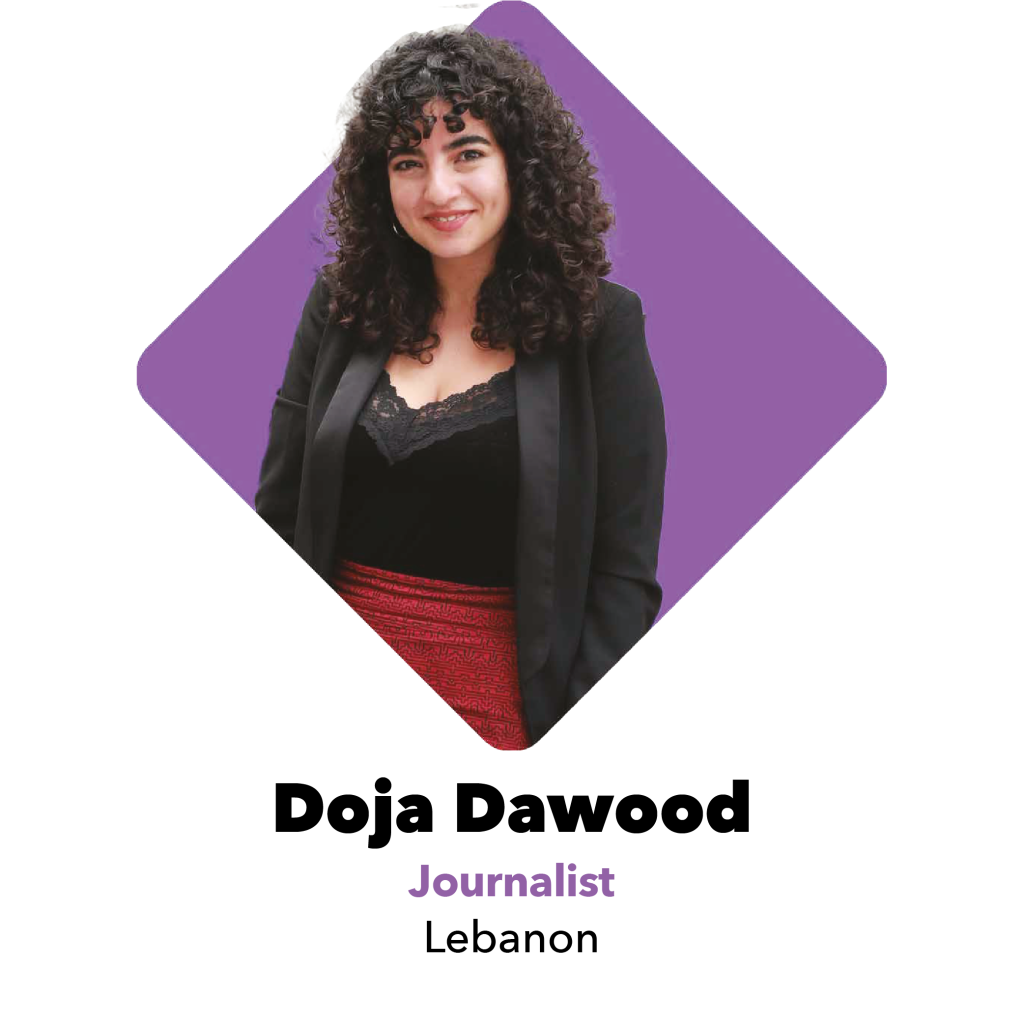
A 34-year-old journalist, researcher, activist, and human rights defender based in Beirut. Through her 15 years of experience, Daoud worked as an editor, reporter, and writer in multiple media outlets in Lebanon and the MENA region, during which she focused on press freedom, women’s issues, and human rights in general.
In 2019, Daoud co-founded the Alternative Press Syndicate, which in 2025 rebranded to the Union of Journalists in Lebanon and gained membership in the International Federation of Journalists. From 2022, Daoud worked at the Committee to Protect Journalists, where she is currently the Levant Program Coordinator. She also continued her work in journalism, writing articles about media and women, managing content for the Syrian initiative Warsheh for Documentation and Advocacy, and hosting a women-focused podcast, Khilqit Binit, produced by Hakawati.
As a researcher, Daoud highlighted the reality and dangers of working in journalism in Lebanon, in a paper published in May, titled “Press Freedom in Lebanon: A Battle on the Margins”. Since April 2025, she has been enrolled in the Gender in Development and Humanitarian Assistance (GDHA) Associate Diploma, a prestigious program led by exceptional local experts in the field.
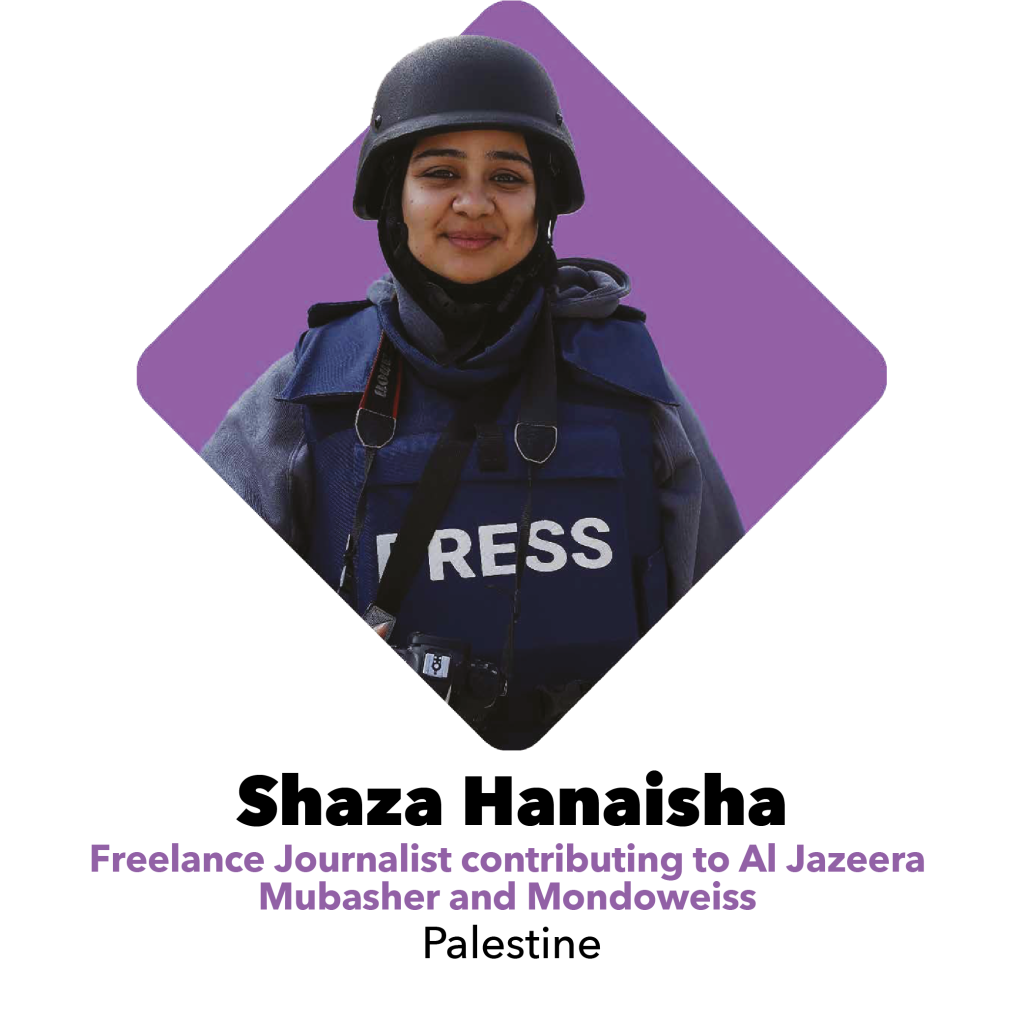
A Palestinian journalist from Jenin, Shatha is recognized for her frontline reporting on Israeli military raids and daily life under occupation in the West Bank. She began her journalism career in 2015 and was a key eyewitness to the killing of journalist Shireen Abu Akleh in 2022.
She is currently pursuing a Master’s degree in Media Studies at the American University of Beirut, supported by the Shireen Abu Akleh Memorial Scholarship. Through her work, she documents both the violence of occupation and the resilience and humanity of Palestinian life.
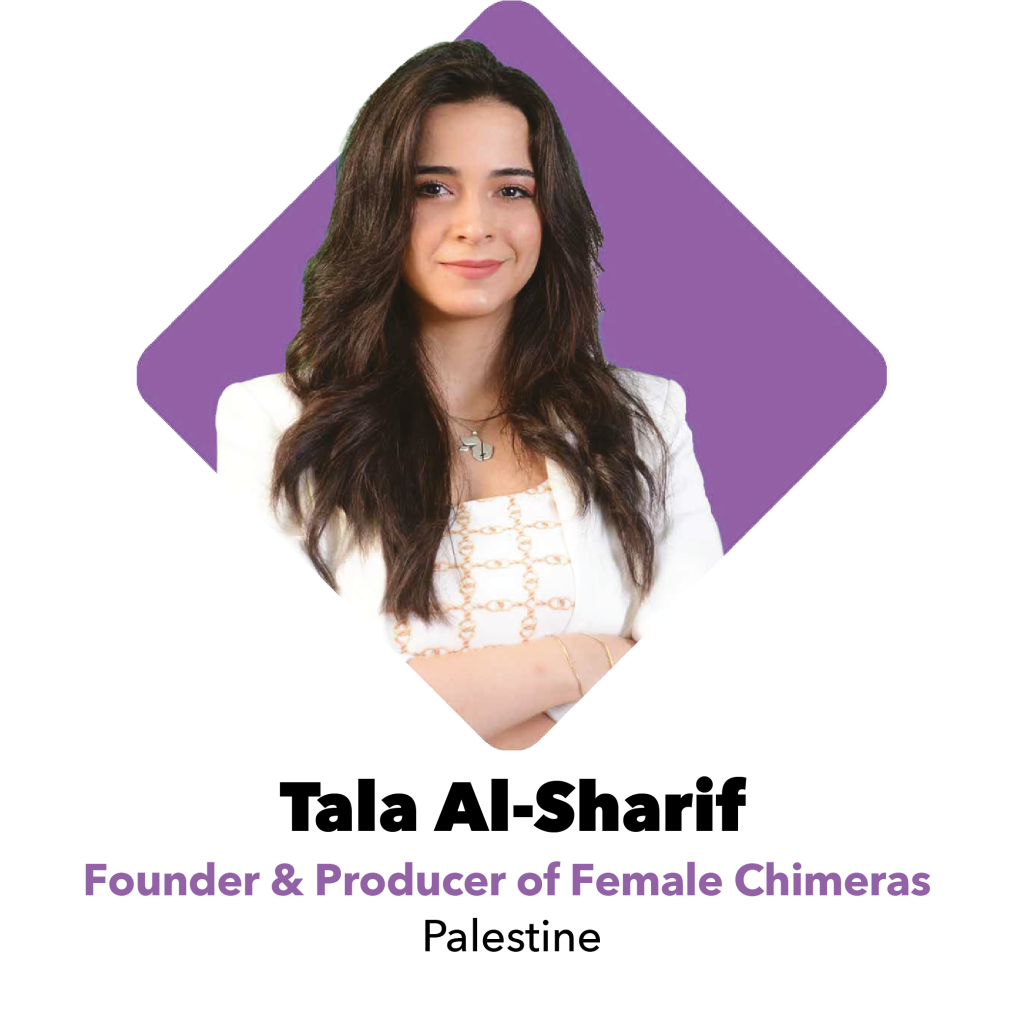
A journalist, producer, and founder of Female Chimeras, a platform dedicated to amplifying Palestinian women’s voices and challenging stereotypes. A Forbes 30 Under 30 honoree for Social Impact, she has reshaped narratives through more than 100 stories, reaching over 25 million people. She has worked with UN Women and various NGOs as a media consultant, and brings deep expertise in gender equality and media literacy from her collaborations with DW and UNESCO. Her award-winning coverage of women in conflict zones and economic reporting continues to inspire audiences and drive meaningful change.
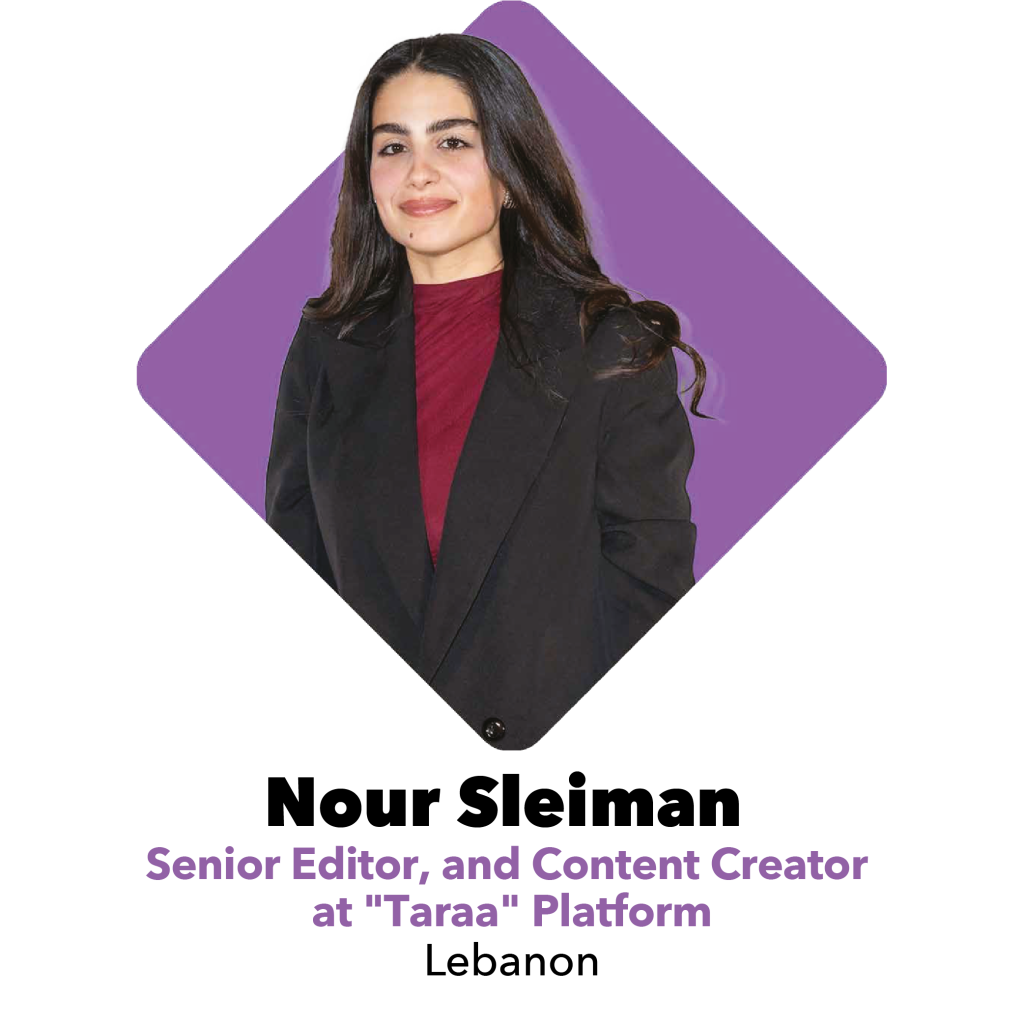
A Lebanese journalist, writer, and content creator with a master’s degree in journalism and media studies. She has worked as a reporter, producer, and communications officer with various local media outlets and international organizations, covering human rights, freedom of expression, and key political and social issues.
Driven by a passion for storytelling and documenting lived experiences, she views journalism as a tool to resist erasure and marginalization. Her work aims to amplify underrepresented voices and reclaim narratives often excluded from mainstream discourse.
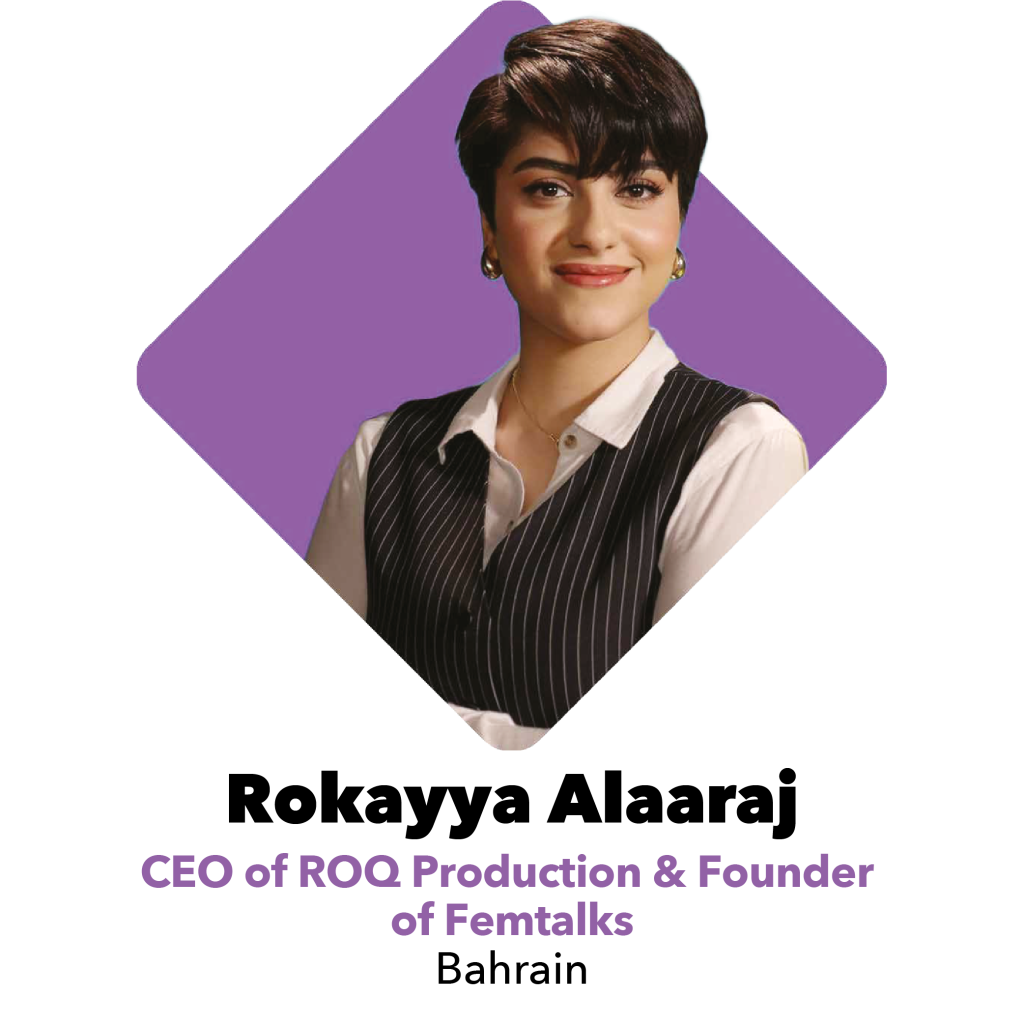
A Bahraini podcast producer, trainer, and entrepreneur. She is the founder of RoqProduction.bh, a podcast production company that offers scripting, editing, branding, and launch support for individuals, influencers, and organizations. As part of its services, the company also runs a women’s empowerment program that provides training and support in podcasting.
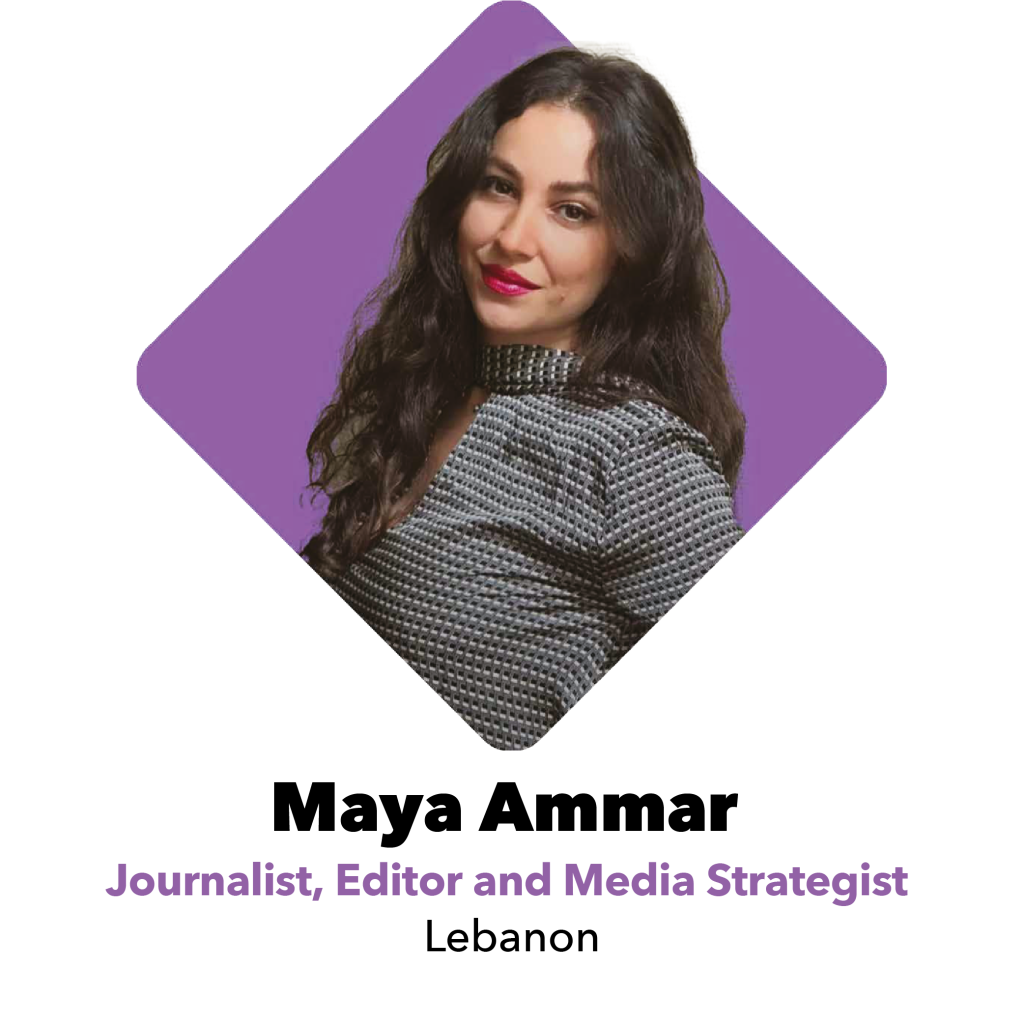
A writer and editor specializing in media and communications, Maya has led several feminist advocacy campaigns in Lebanon. She currently contributes to various independent platforms as a journalist, editor, and translator. Since 2018, she has produced dozens of videos that provide valuable information for women and reflect her perspectives on complex feminist issues. In 2024, she launched a feminist podcast as part of this ongoing work.
In addition to content production, Maya develops media strategies for a range of advocacy campaigns and brings extensive experience in supporting civil society organizations—facilitating discussions, leading training workshops, and producing guides and manuals on gender, media, and communication.
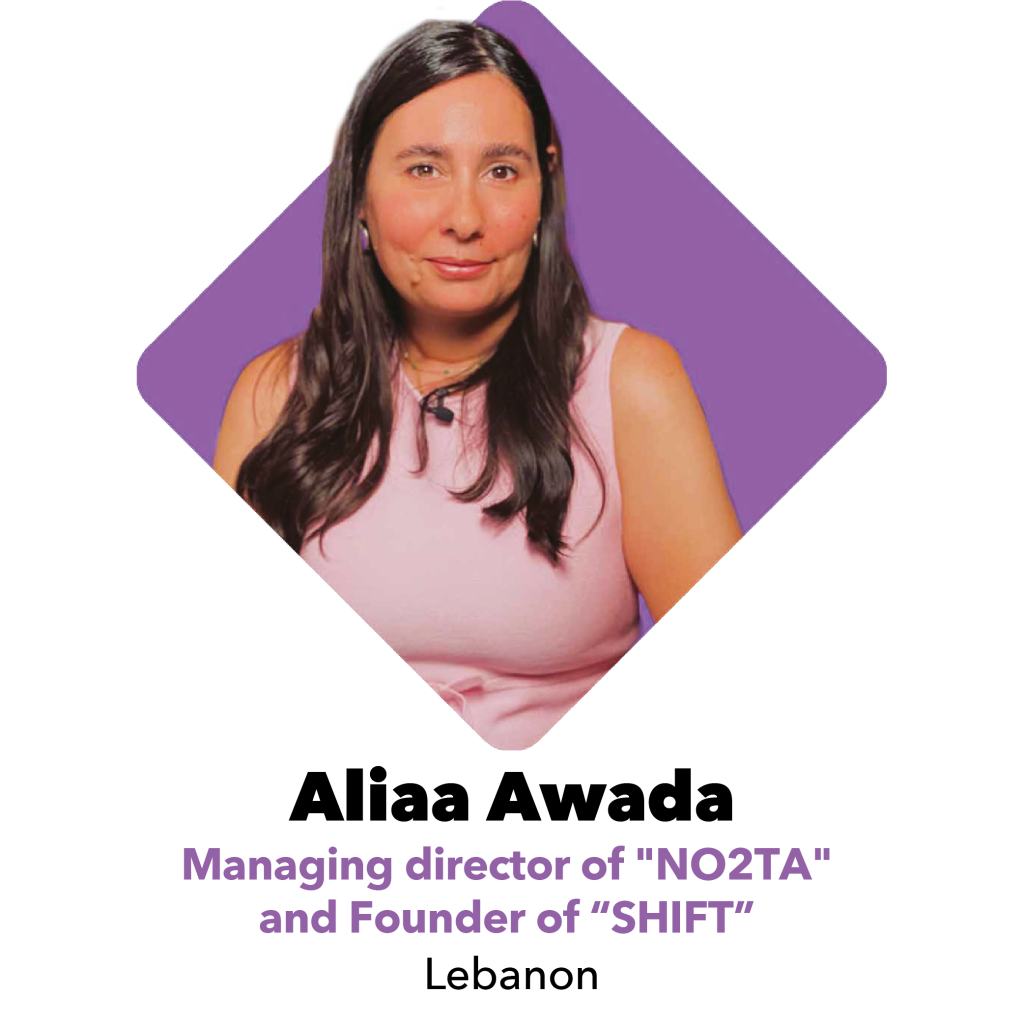
Founder and Managing director of “NO2TA” The Feminist Lab and “SHIFT” that is focusing on Transforming society through new feminist media production and content creation. Awada has a master’s degree in journalism from Beirut Arab University and more than 14 years’ experience in media, advocacy, and campaigning work with special knowledge of gender and child rights issues. Awada, delivers training on gender-sensitive media coverage, advocacy, and digital campaigning with a special focus on social behavioral change. Awada have led nationwide campaigns in Lebanon with many national and international organizations like Save the Children, ABAAD, International labor organization, Oxfam, CRTDA and Fe-Male. Awada is a feminist activist, and she is the Co Founder of both Fe-Male and the feminist portal sharikawalaken.
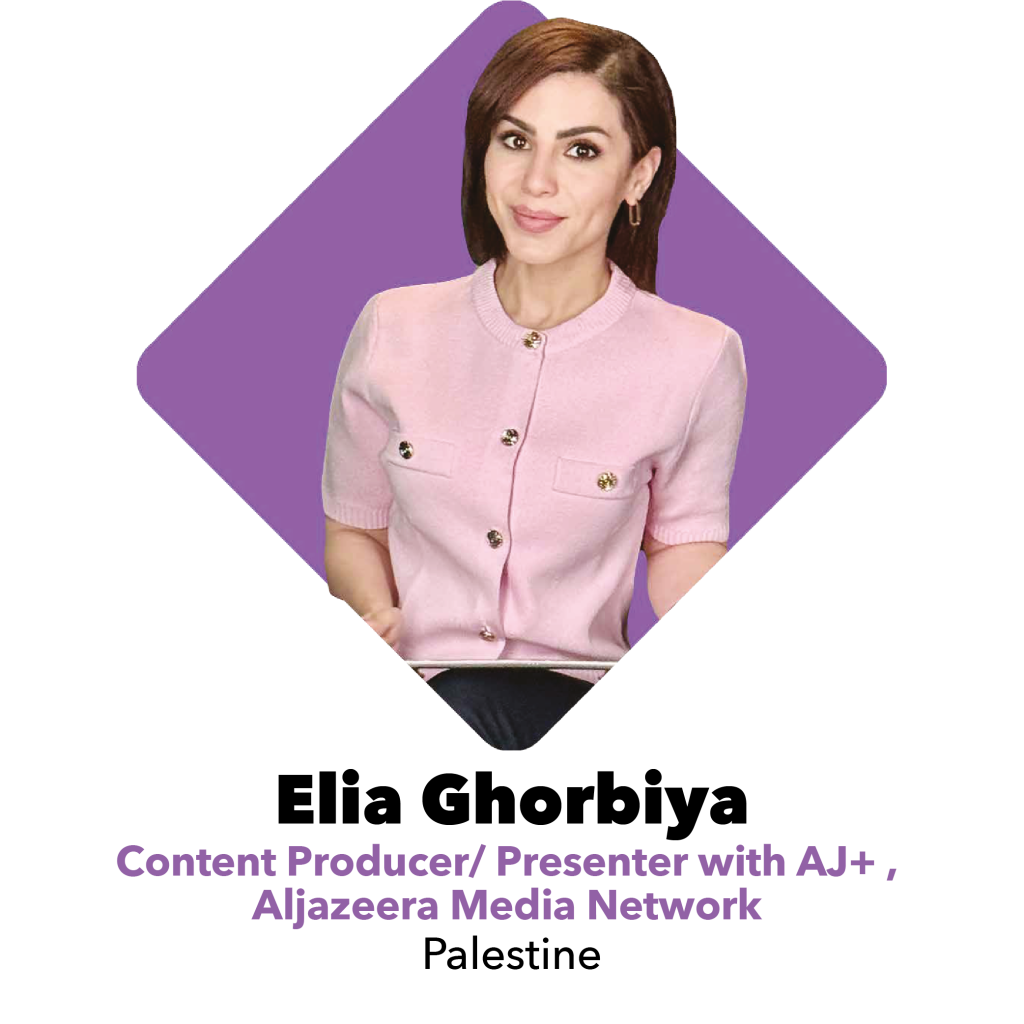
A passionate and multi-skilled Palestinian journalist, Elia is an award-winning media professional with over ten years of field experience in digital storytelling and video journalism. She currently works as a presenter and content producer at AJ+ Arabic, the digital arm of Al Jazeera Media Network. She previously contributed to the AJ Contrast team, where she helped produce immersive content using 360-degree video and virtual reality technologies from around the world.
Elia began her career in Palestine as an independent producer, creating impactful stories for major international media outlets. Alongside her media work, she also dedicates time to training young journalists and content creators through workshops and programs, driven by her belief in the power of digital media as a tool for change.
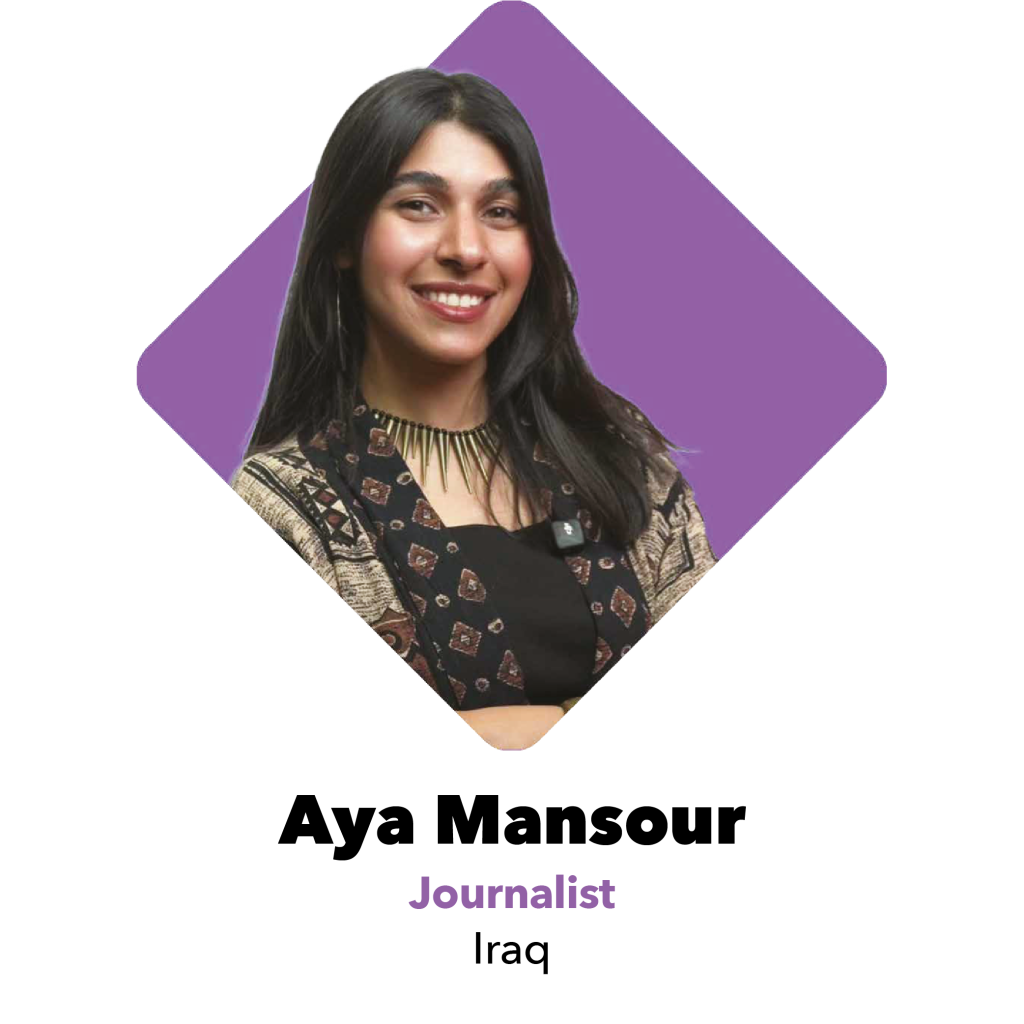
An Iraqi writer and journalist currently working with Independent Arabia. She has previously contributed to leading platforms such as Al Jazeera and Vice Arabia. Her journalism focuses on in-depth reporting and investigative work, with a particular emphasis on women’s issues, marginalized communities, and war survivors.
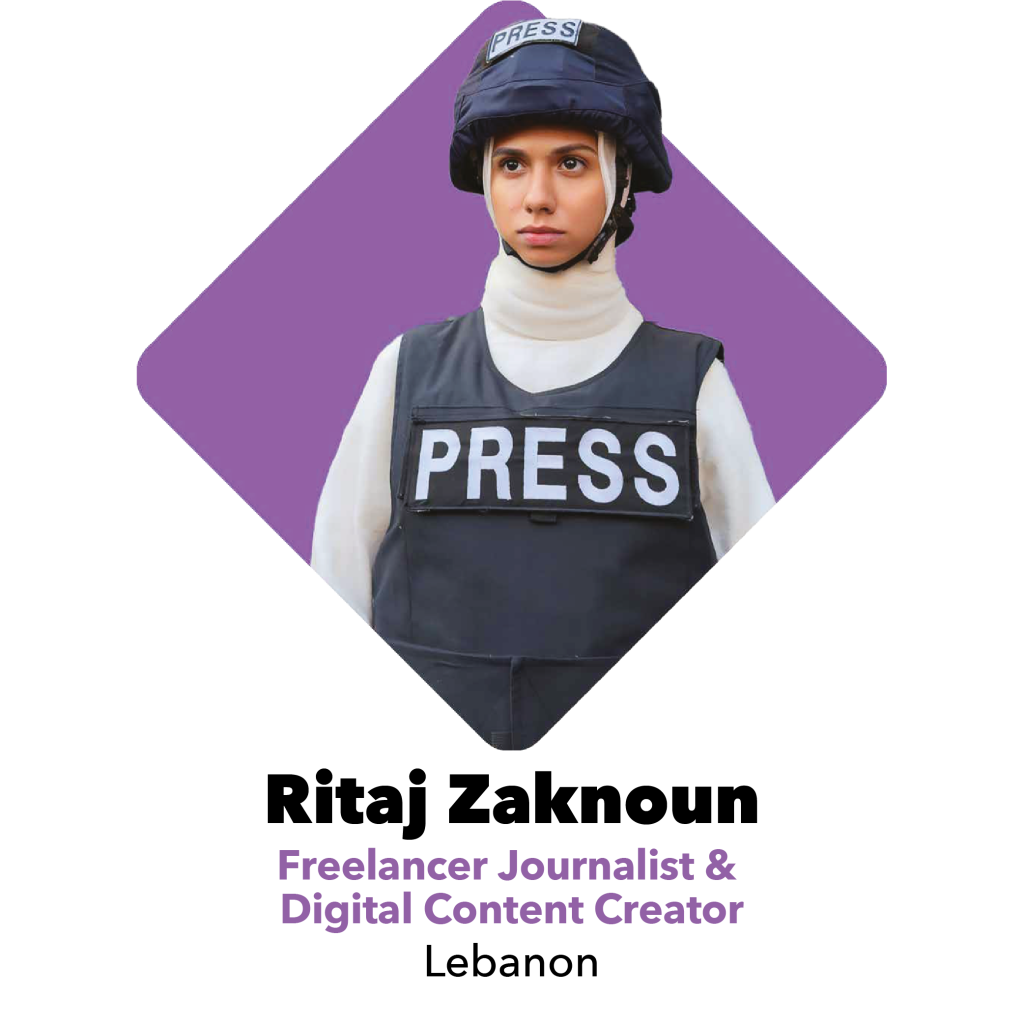
A Lebanese journalist and digital content creator passionate about storytelling, social impact, and highlighting inspiring human experiences. She has covered powerful stories from across Lebanon, including during times of conflict like the recent war, using her platform to amplify voices that are often overlooked. With a strong presence on Instagram and other platforms, she produces emotionally-driven visual reports and short documentaries rooted in empathy and authenticity. Recently, she has been dedicating time to training young content creators through workshops and programs, driven by her belief in the power of digital media as a tool for change.
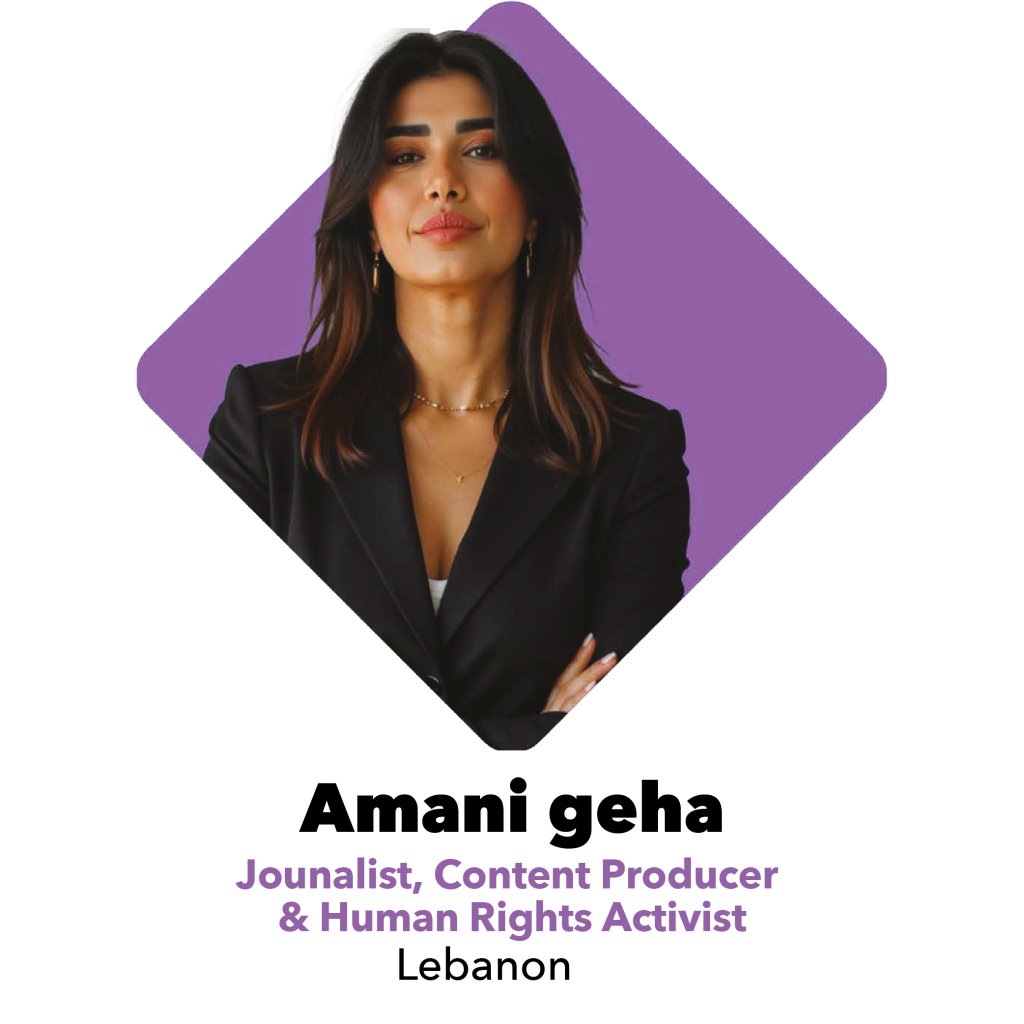
An experienced TV presenter, journalist, and content producer with a strong background in news, entertainment, and digital media. She has worked across Qatar, Lebanon, and Kuwait, delivering engaging and high-quality content. At Alaraby TV Network in Qatar and Lebanon, she hosted news programs and created digital content. She also produced, wrote, and presented the satirical show Malaket and contributed to the morning program Sabah Al-Nour. In addition, she conducts training sessions in media presentation, journalism, news writing, and scriptwriting for news, entertainment, and satire.
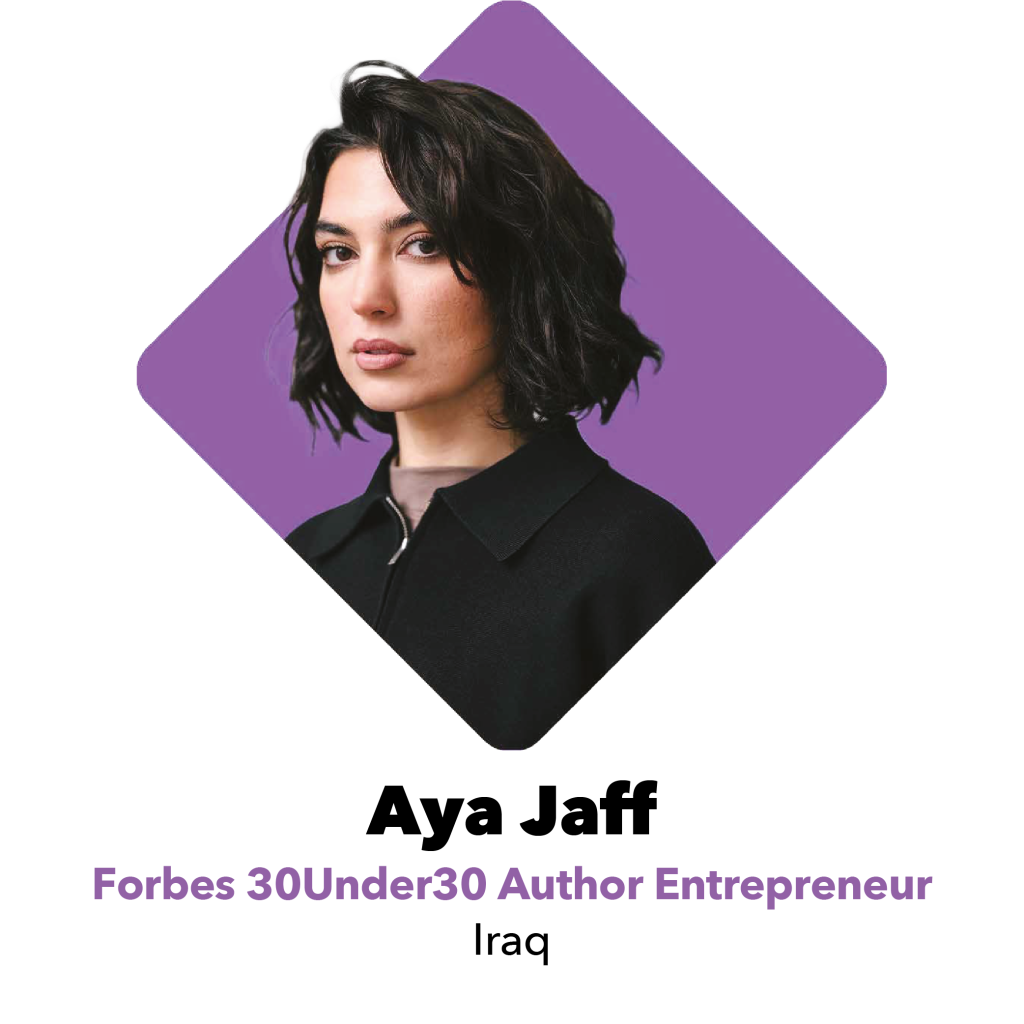
Was once deeply immersed in the worlds of tech and finance—as a coder, entrepreneur, and insider. Today, she critically examines the very systems she helped shape, speaking out on power, progress, and the ethical challenges of capitalism. Her German TV show How to Get Rich, Aya? and the conference she founded, Data Unplugged, offer bold and thought-provoking perspectives.
Once dubbed “Mrs. Code” by DIE ZEIT and named to the Forbes 30 Under 30 list, Aya now shares the journey of a tech-world dropout in search of fairer alternatives. Her bestselling book Moneymakers made financial literacy accessible, while her upcoming title Broligarchy delivers a sharp critique of the tech elite.
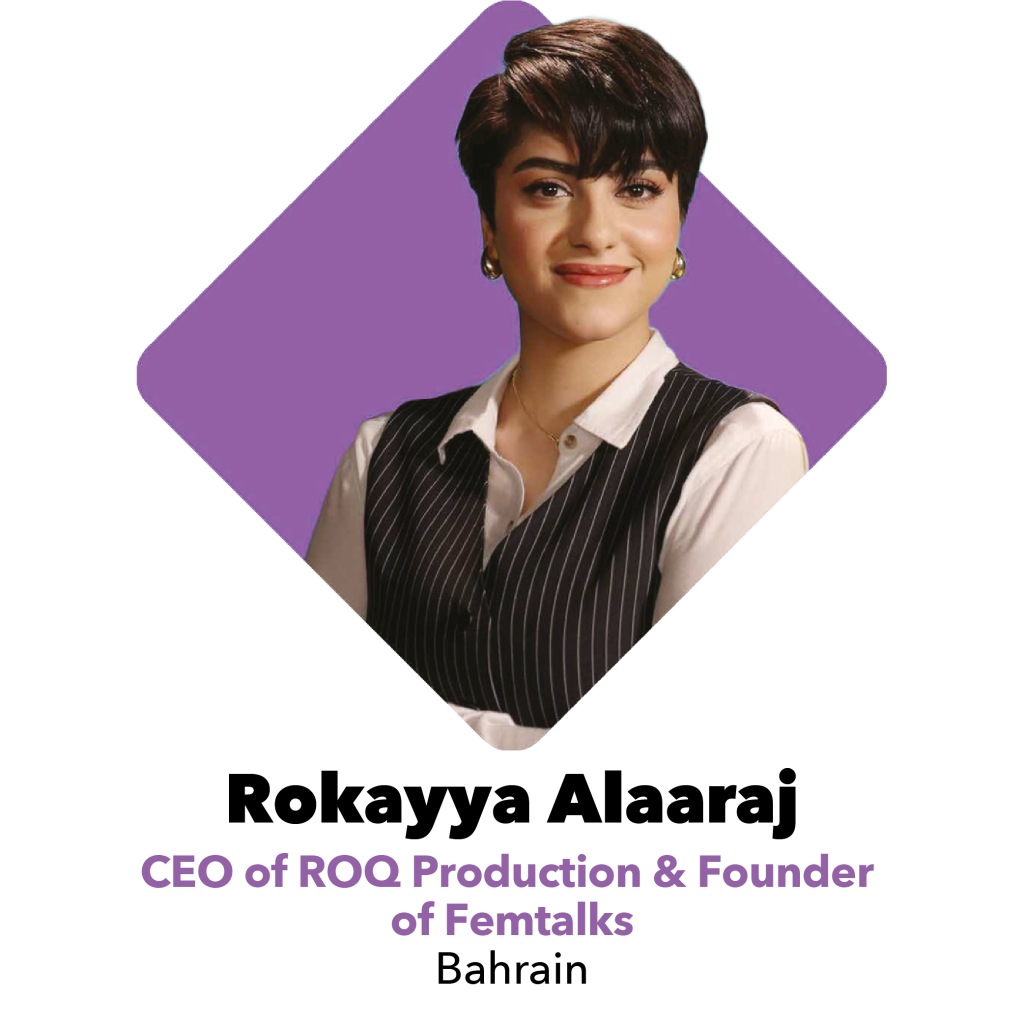
A Bahraini podcast producer, trainer, and entrepreneur. She is the founder of RoqProduction.bh, a podcast production company that offers scripting, editing, branding, and launch support for individuals, influencers, and organizations. As part of its services, the company also runs a women’s empowerment program that provides training and support in podcasting.
Roqayyah is also the founder of FemTalks, a podcast dedicated to telling women’s stories and highlighting their achievements. Beyond content, FemTalks serves as a space to inspire, celebrate, and amplify women’s voices across the Arab world.
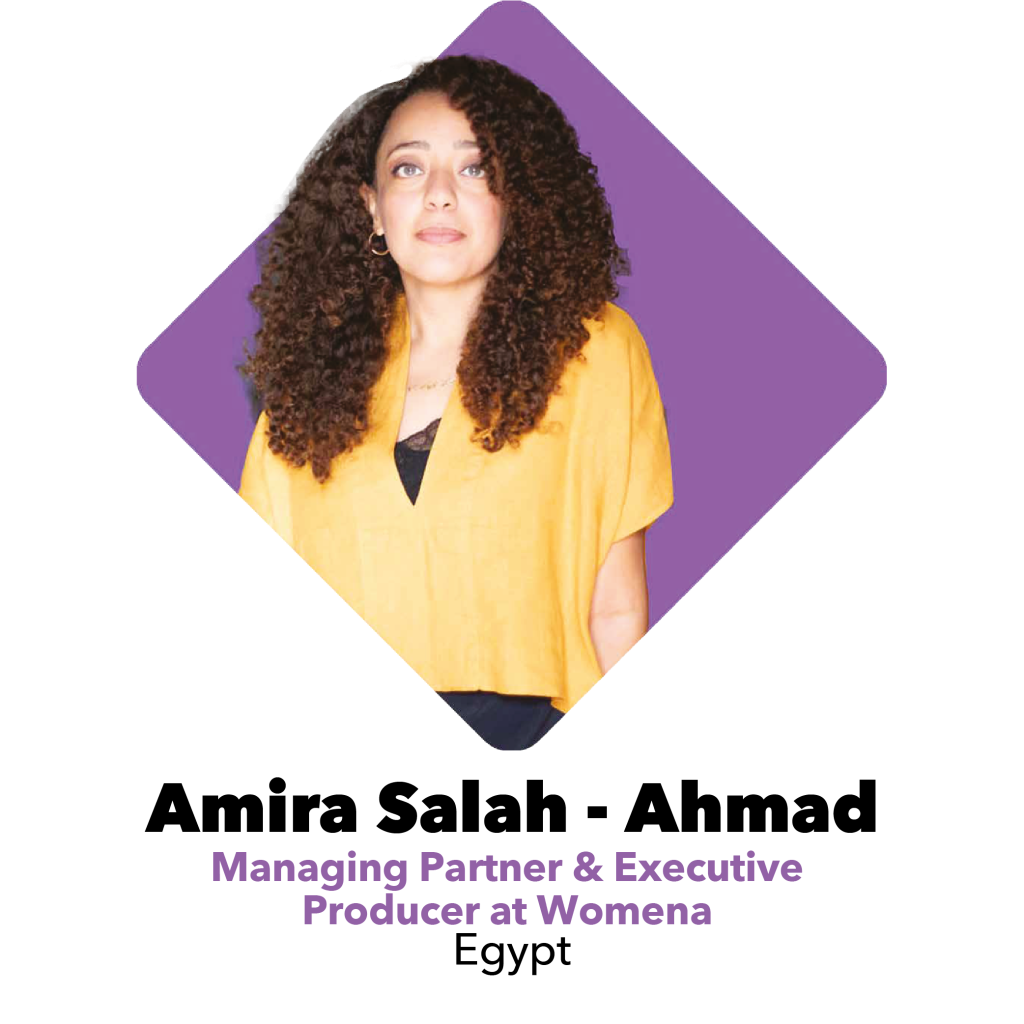
A Cairo-based director, producer, writer, and former journalist with over 20 years of experience in the media industry. She is the Managing Partner and Executive Producer at Womena, a feminist media company focused on telling stories of women in and from the Arab world. Since 2018, she has led the company’s editorial strategy, production, and growth, steering its focus toward impact-driven storytelling through a feminist lens.
Previously, Amira worked as a journalist, editor, and media entrepreneur in Egypt, contributing to both local and international outlets. She is also a co-founder of Mada Masr, a prominent independent news platform in the region.
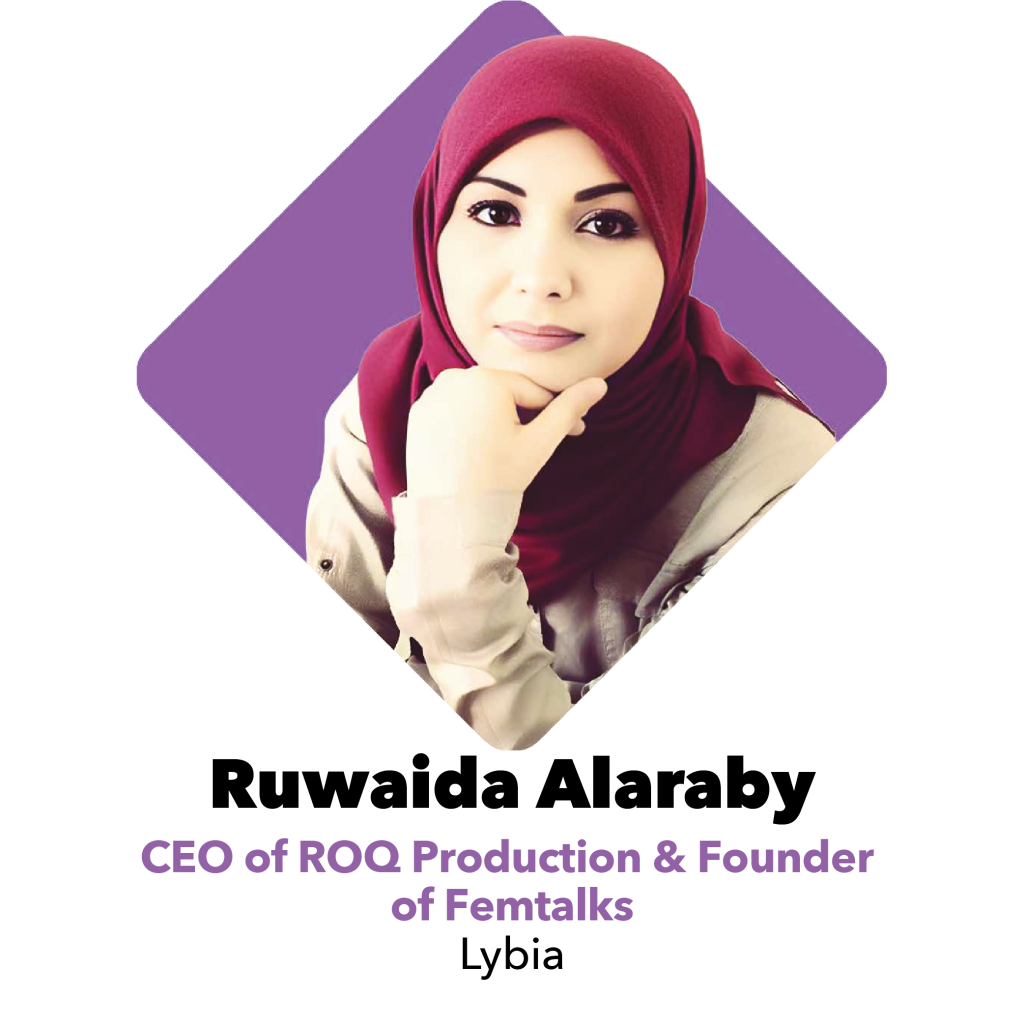
a Libyan journalist and the founder of “She Checks” the first feminist fact-checking platform in the Arab region and globally. After years of working with local and regional fact-checking outlets, she observed a persistent disregard for misinformation specifically targeting women. This, combined with the increasing misuse of artificial intelligence to distort and attack women online, motivated her to launch She Checks.
The platform focuses on the gendered dimension of disinformation, aiming to protect women’s digital presence, especially activists, journalists, and public figures in Libya and the Maghreb. Ruwaida is deeply committed to amplifying women’s voices, promoting media literacy, and advocating for inclusive and safe digital spaces.
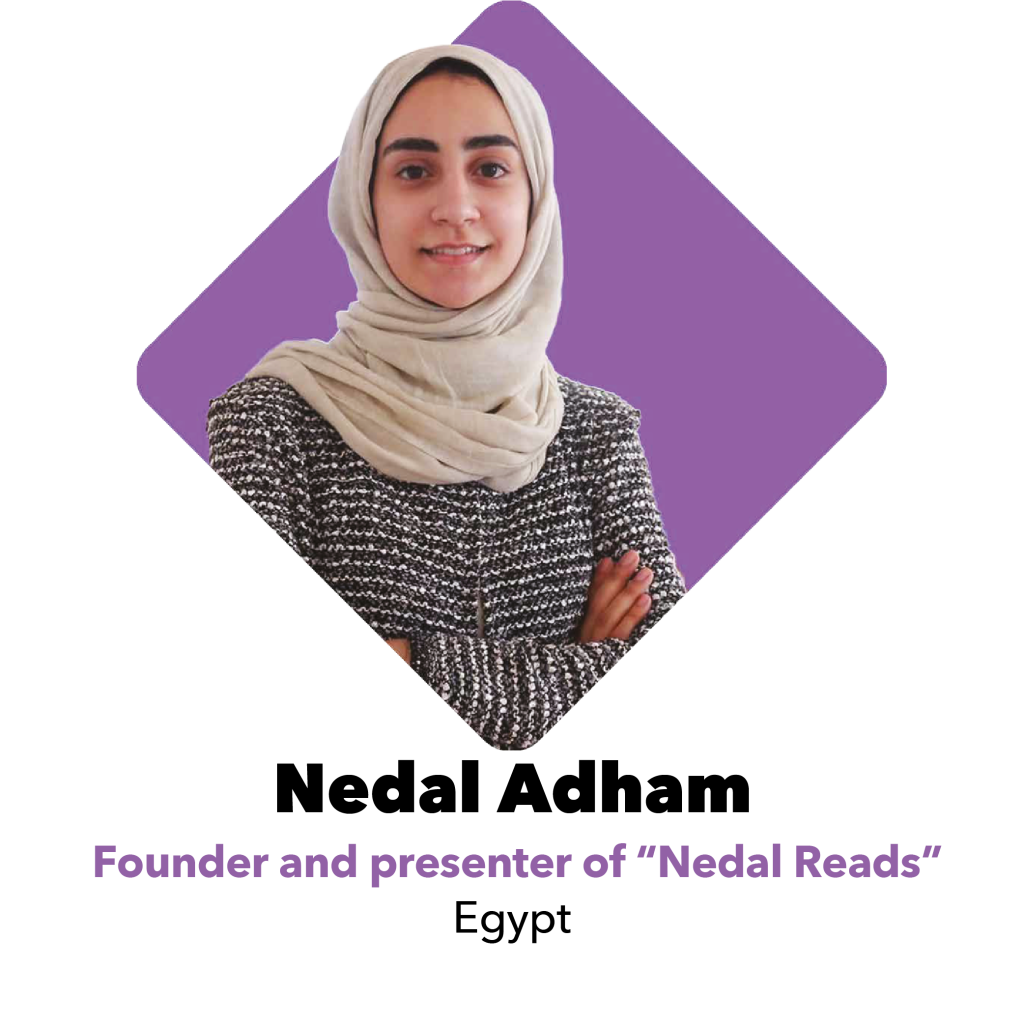
A content creator and researcher focusing on gender and social issues. Through her social media platforms, she shares thoughtful, human-centered content that blends literature with social analysis from a feminist perspective. Alongside her digital work, Nidal has an academic background in gender and development studies.
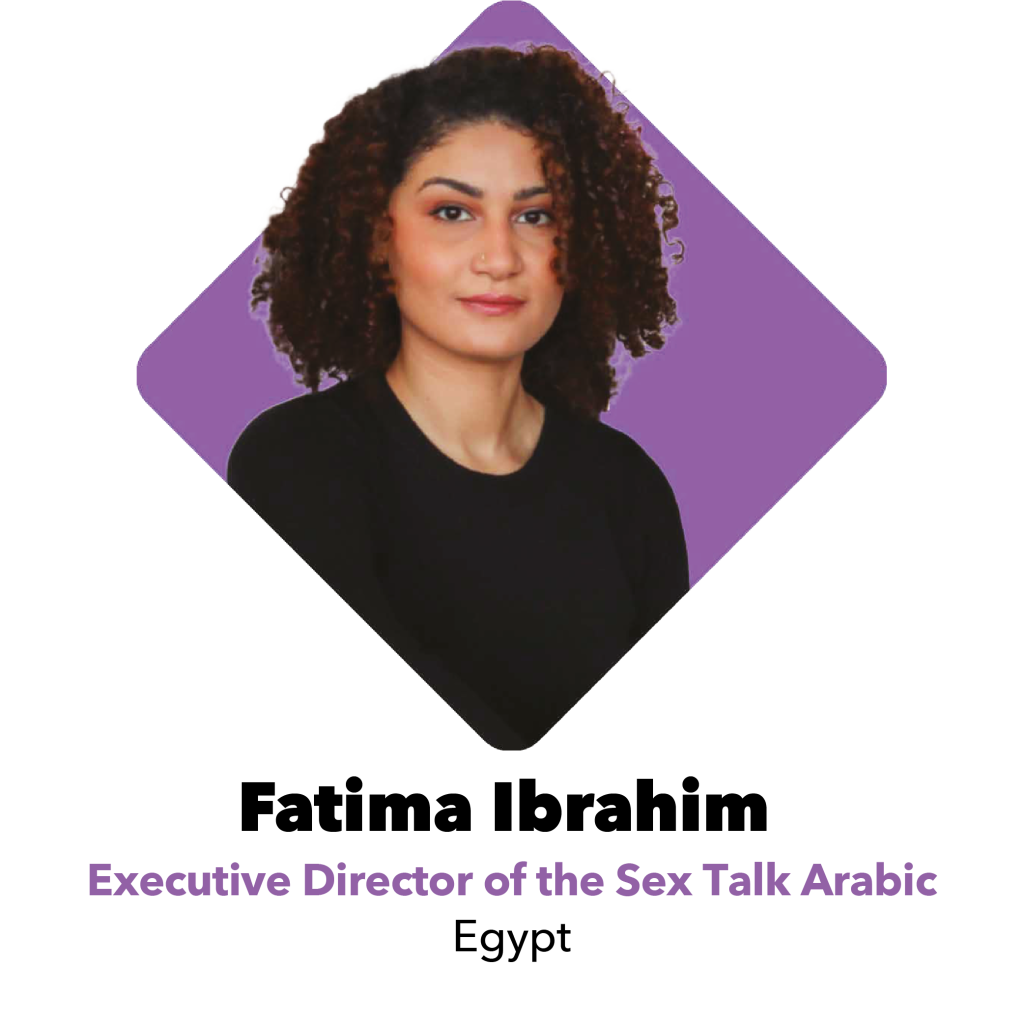
A feminist academic, researcher, and activist, she engages in feminist thought and practice across multiple fields. Her academic work focuses on feminist economics, public policy, and gender studies. In her activism, she supports feminist movement building across the SWANA region, with a particular emphasis on grassroots and digital organizing.
She also works to advance decolonial feminist funding frameworks and advises donors on how to adopt and implement these approaches. One of her most notable initiatives is The Sex Talk بالعربي, a feminist digital platform she launched in 2018 to raise awareness around sexual and reproductive health and rights (SRHR), and to provide positive, feminist-informed sex education in Arabic. The platform is widely recognized as a pioneering force in sparking a digital revolution around SRHR in the region.
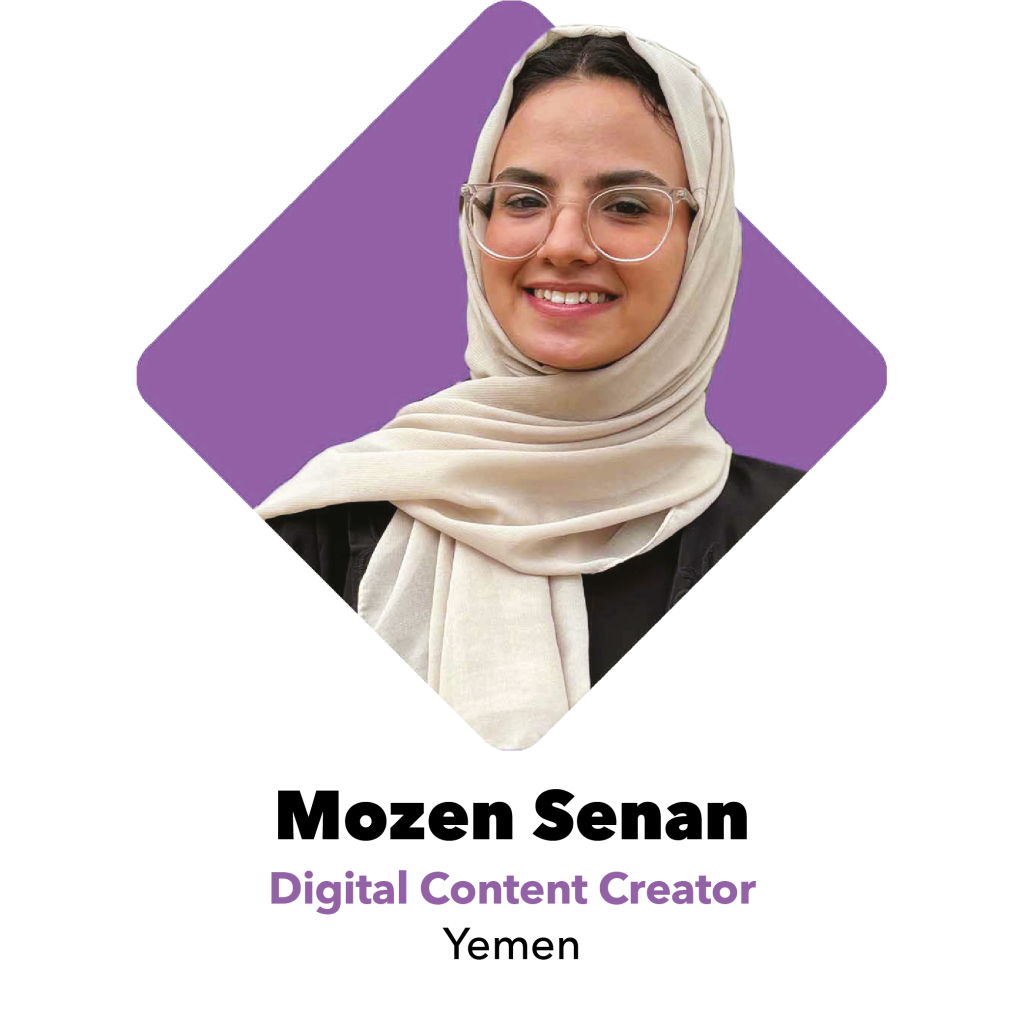
A social activist and content writer, she focuses on highlighting the challenges facing Yemeni society, particularly those related to women’s rights and freedoms.
She has managed digital content for several prominent organizations, including SMEPS, YWT, Etreek24, and Mwatana for Human Rights, with a strong emphasis on raising public awareness across diverse issues.
Believing in the power of words as a form of resistance, she strives to be a clear and independent voice that amplifies the struggles of Yemeni women and contributes to meaningful awareness and empowerment.
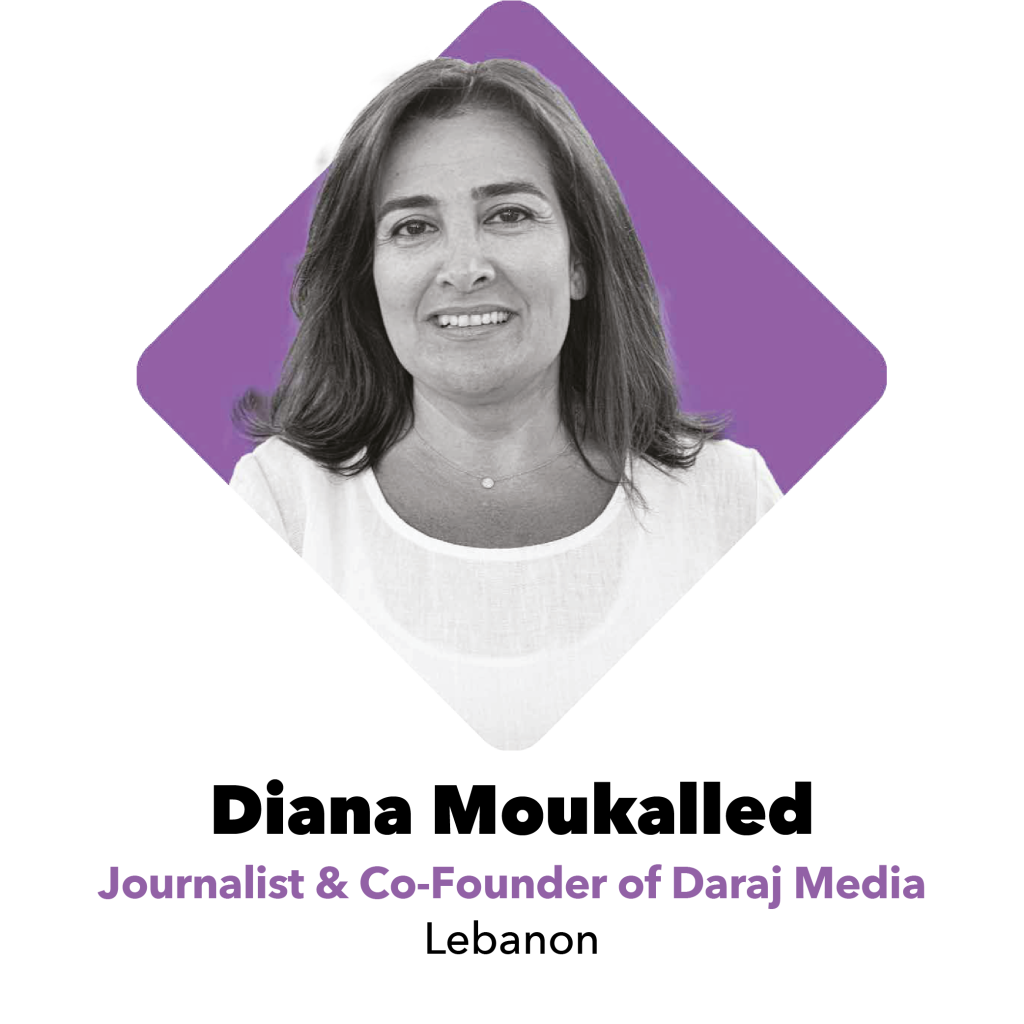
A Lebanese journalist, writer, and activist with over 35 years of experience across television, print, and digital media. Her work focuses on democracy, women’s rights, and freedom of expression. She rose to prominence in the mid-1990s for her frontline reporting from conflict zones across the Arab world and beyond.
In 2017, she co-founded Daraj, an independent news platform where she currently serves as Executive Editor. Through Daraj, she leads efforts to advance investigative journalism that holds power to account and challenges political and social taboos in the region.
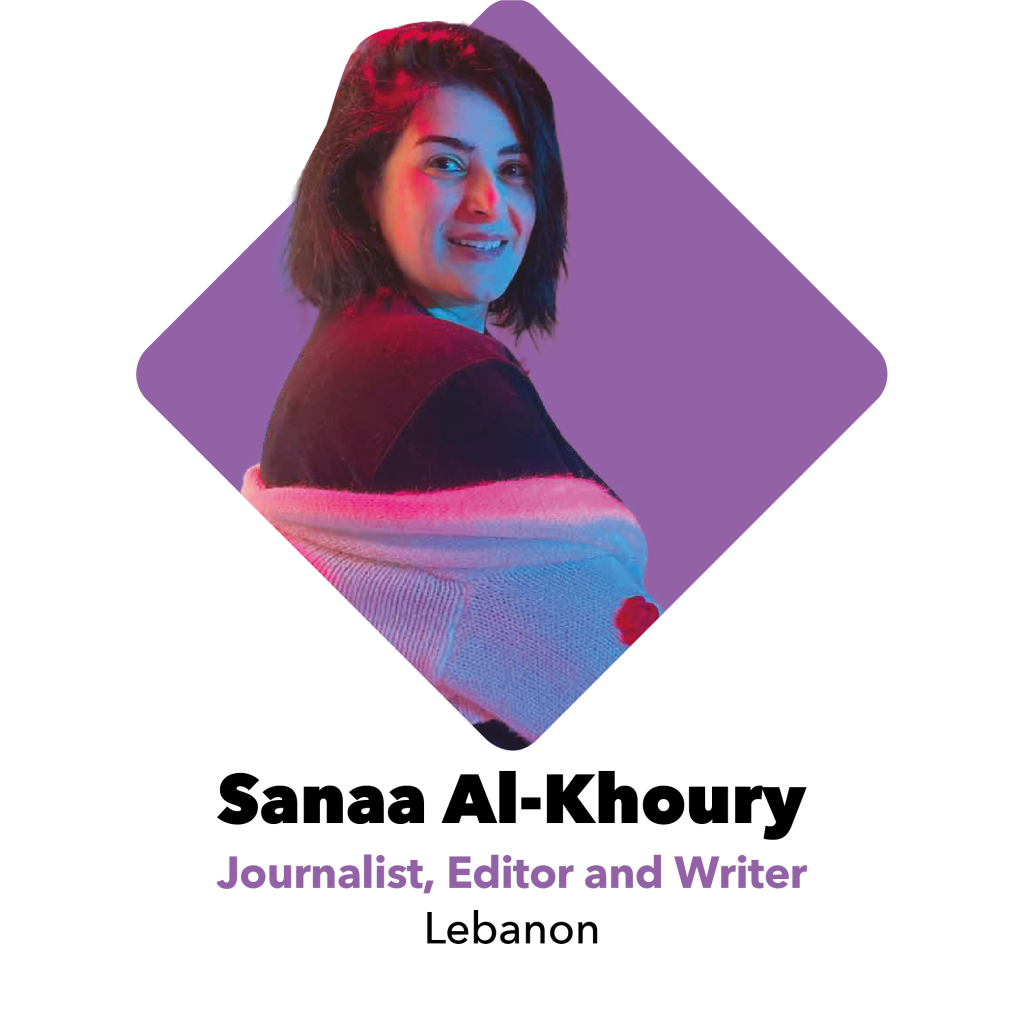
A Lebanese journalist, editor, and content creator with over 15 years of experience working across print, digital, and broadcast media. Her career has spanned leading Arab platforms like As-Safir, Vice Arabia, 7ibr, Raseef22, and No2ta. She currently writes and reports for BBC Arabic Online.
Sanaa’s work explores the intersections of gender, politics, religion, and culture, often weaving personal insight with a feminist edge. Interested by cinema, theatre, and pop culture, and has a deep love for cats and stories that disrupt the familiar. “
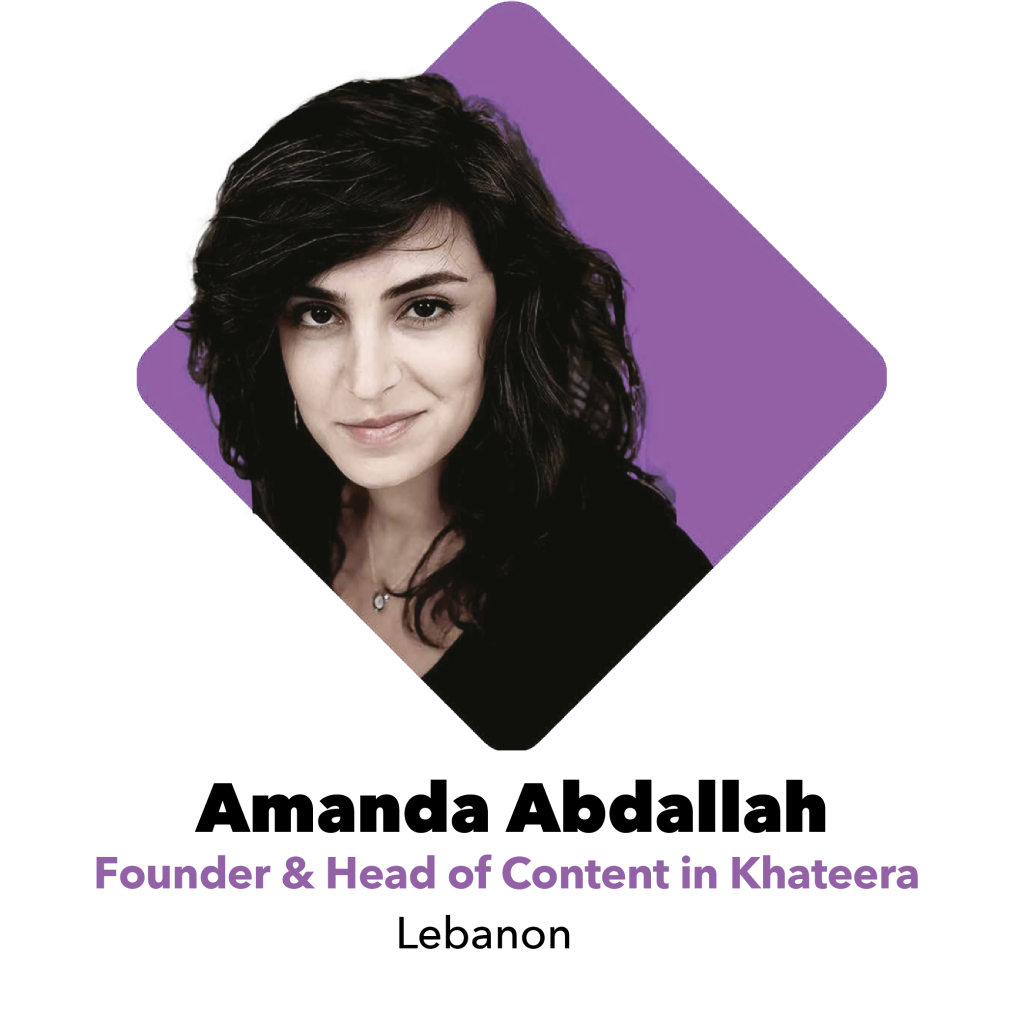
A scriptwriter, director, and media strategist, Amanda is dedicated to reshaping narratives around Arab women. As the founder and creative force behind Khateera, a bold and pioneering feminist media platform, she creates thought-provoking content that challenges norms and centers Arab women as complex, powerful protagonists.
With over 16 years of experience at the intersection of gender, politics, and culture, Amanda blends critique with creativity, and satire with sincerity, across formats ranging from docu-series and explainer shows to high-impact advocacy campaigns.
Her work has garnered multiple international awards and reached over 500 million viewers. Driven by a relentless pursuit of truth and an unapologetic refusal to conform, she creates media that questions, inspires, and transforms.
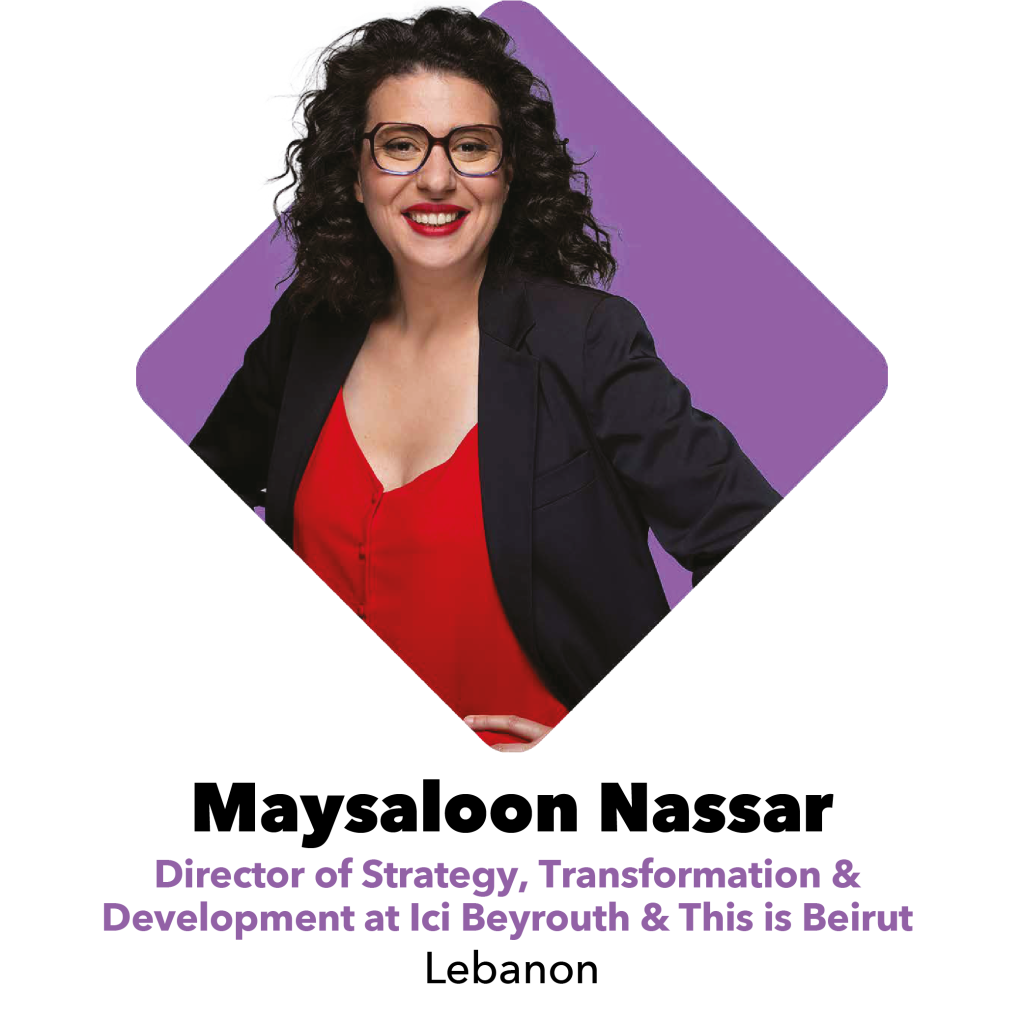
Lebanese-French media professional with over twenty years of experience in journalism and communications. She currently serves as the Director of Strategy, Transformation, and Development at Ici Beyrouth and This is Beirut, two digital platforms specializing in Lebanese and international news coverage in French and English.
She began her career at an early age with a strong focus on human rights and gender equality issues. In 2014, she launched the program Hi Al-Hadath (She is the Event) on France 24, a show dedicated to women’s issues in the Arab world, which she hosted for ten years. A year later, she created Fi Falak Al-Mamnou’ (In the Orbit of the Forbidden), a pioneering program that addressed over 200 sensitive topics within Arab societies. In 2022, she launched the series Qalou Lakum (They Told You), aimed at dismantling false narratives and breaking down media stereotypes.
In addition to her work in program production and television presenting, Maysaloun held the position of advisor on sexual harassment and discrimination issues at France Médias Monde, which includes France 24, RFI, and Monte Carlo Doualiya. She also works as a consultant and trainer in the fields of gender and media, collaborating with regional and international organizations to promote inclusive, rights-based journalism, and to train and support the emerging generation of journalists.
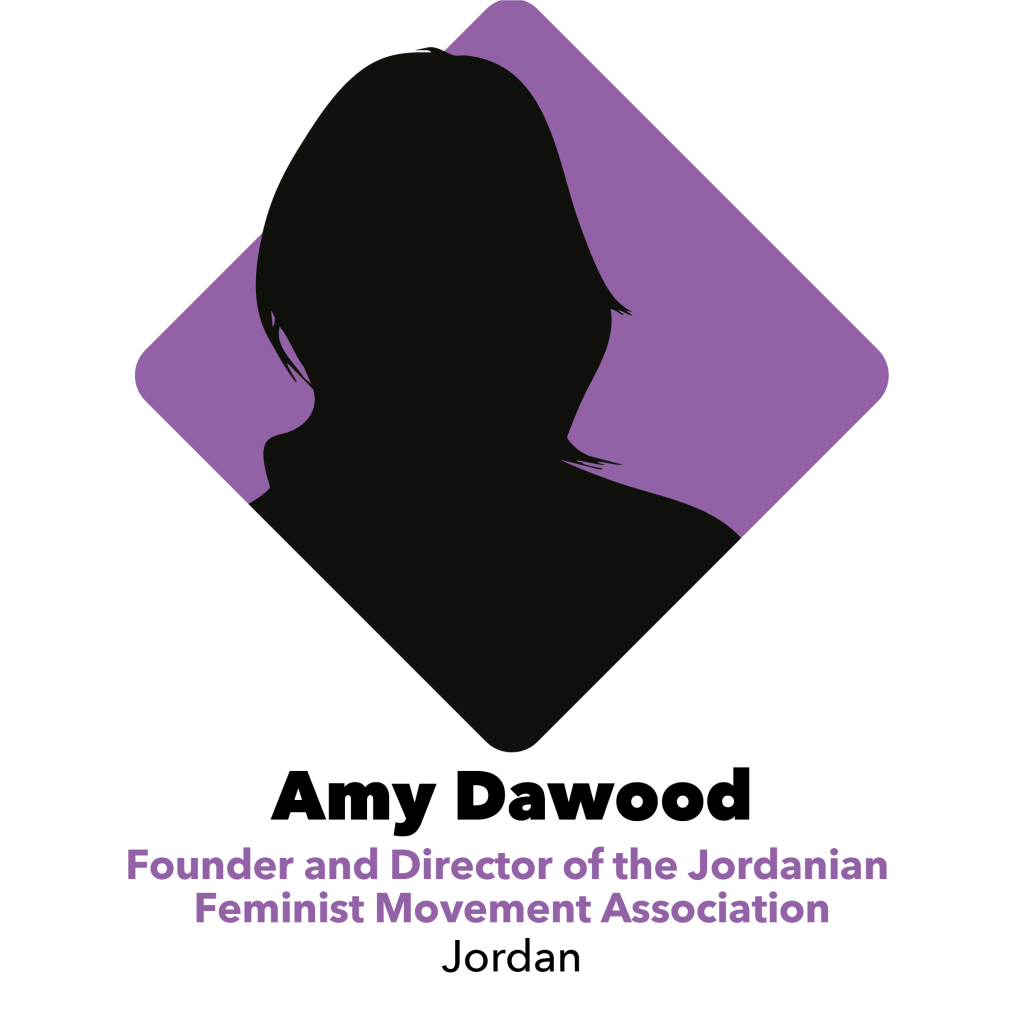
The founder and director of the Jordanian Feminist Movement Association, a human rights activist and worker with over ten years of experience in protection and advocacy, focusing particularly on victims of war, refugees, children’s rights, and women’s empowerment. Since 2012, she has led impactful efforts both on the ground and online, including establishing a widely followed social media platform in Jordan that addresses human rights and public opinion issues with sensitivity and objectivity. Her work includes case management by providing financial, psychological, and logistical support to survivors, alongside coordination with relevant authorities. She has also designed and led strong advocacy campaigns focusing on gender-based violence and women’s rights, in cooperation with UN agencies, international organizations, and human rights bodies. Alongside her human rights activism, Amy has extensive experience in the education sector; since 2015, she has been teaching various school subjects, with a particular focus on empowering students, especially girls, through inclusive, learner-centered curricula.
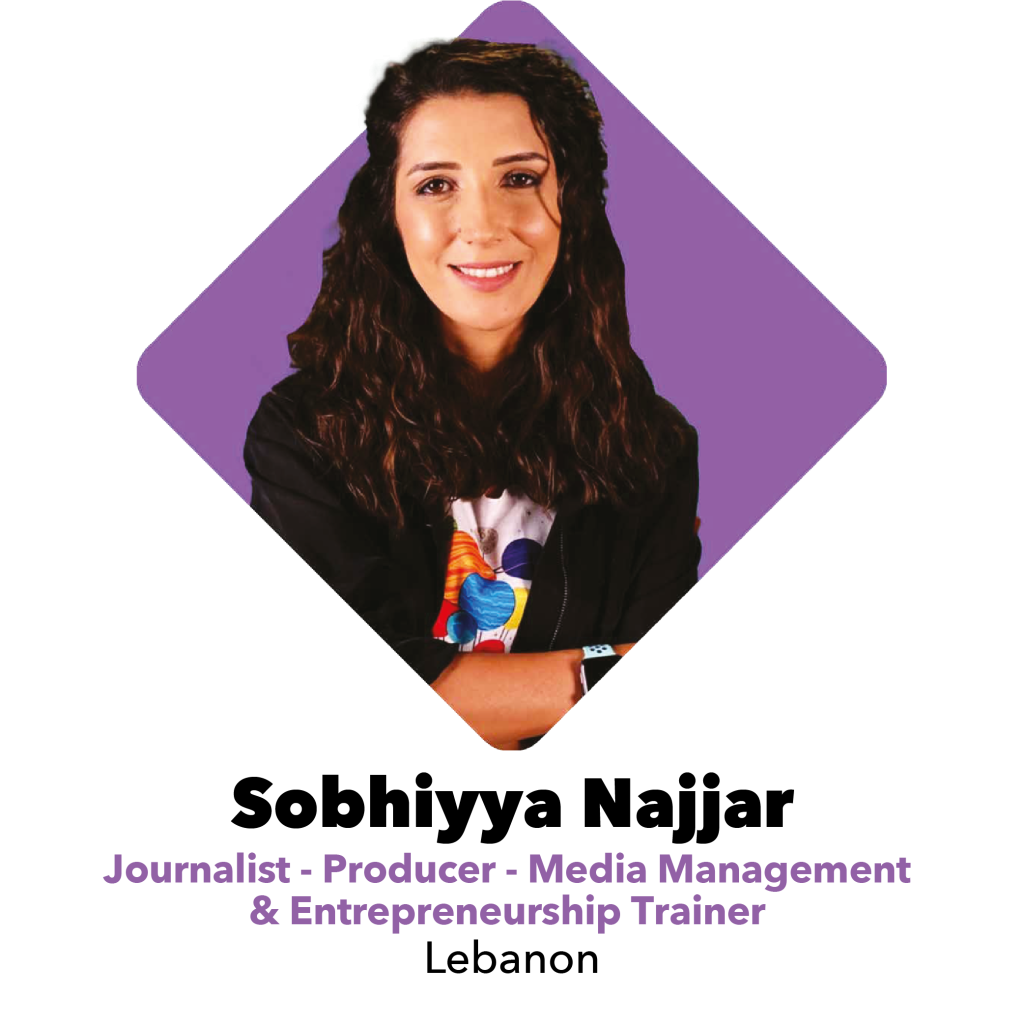
A Lebanese journalist, TV producer, media advisor, and feminist media trainer with over 15 years of experience in news production, election coverage, and storytelling focused on political, social, environmental, and humanitarian issues across the Arab world. She centers the voices of marginalized groups, especially women, children, domestic workers, and persons with disabilities and has led campaigns and produced films on social protection, economic rights, and care work in Lebanon and the region.
Sobhiya produced and hosted a weekly BBC Arabic program on Arab women and current affairs, highlighting feminist perspectives on political participation, legal reform, and gender norms. She also creates podcast series exploring women’s roles in policy and politics.
Her experience includes work with LBCI, BBC Arabic, Al Jazeera O2, and Raseef22, as well as collaborations with DW Akademie, UNDP, MSF, the Asfari Institute, and Maharat Foundation on media and policy-related projects. She has reported from Jordan, Qatar, the UK, Denmark, France, and North Africa, connecting grassroots voices with policy impact. She also holds a Master’s degree in Management and Economics from the University of Perpignan Via Domitia in France.
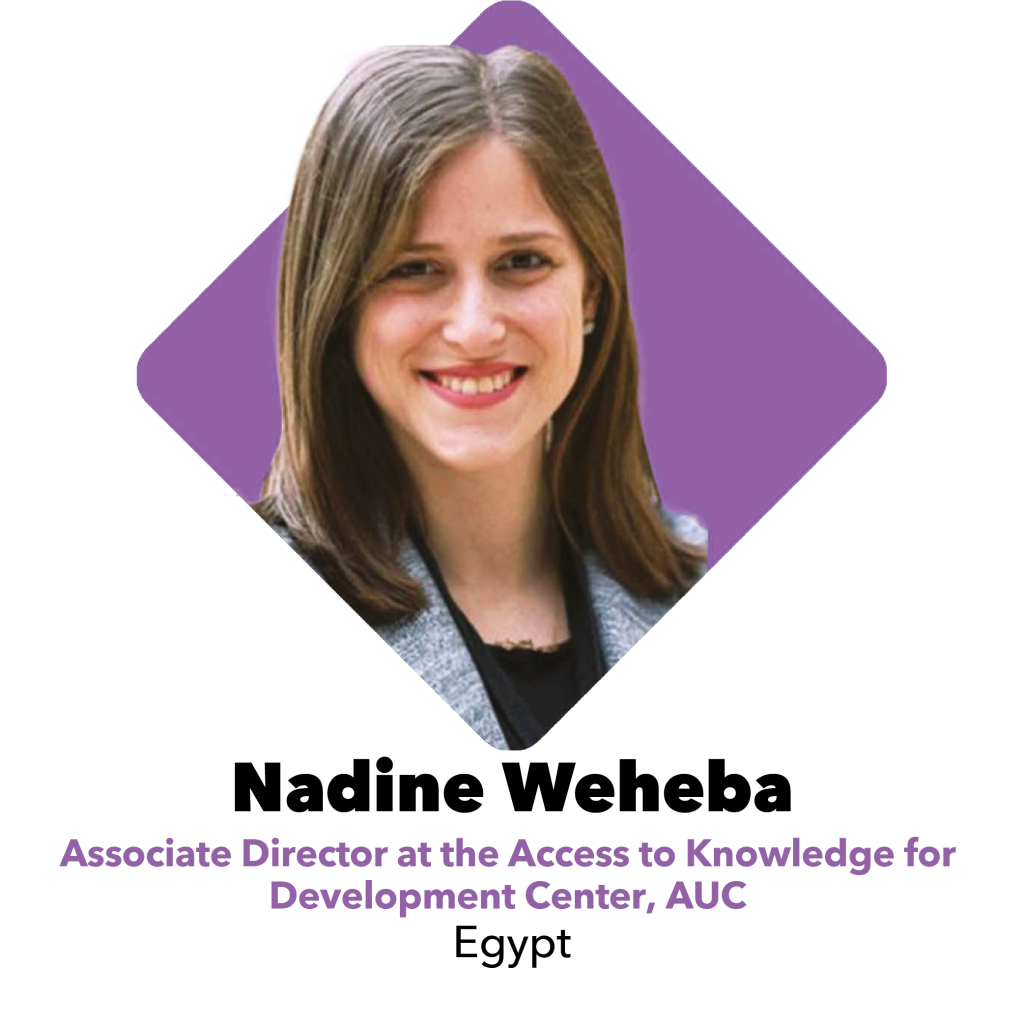
Associate Director at the Access to Knowledge for Development Center. Her research focuses on the political economy of new technologies, innovation, and development. She is particularly interested in how emerging technologies such as artificial intelligence can be made more inclusive of women, youth, and vulnerable groups in the Middle East and North Africa (MENA). Nadine conducts empirical, policy-oriented research that explores the complex inequalities faced by women and marginalized communities within the region’s digital economy.
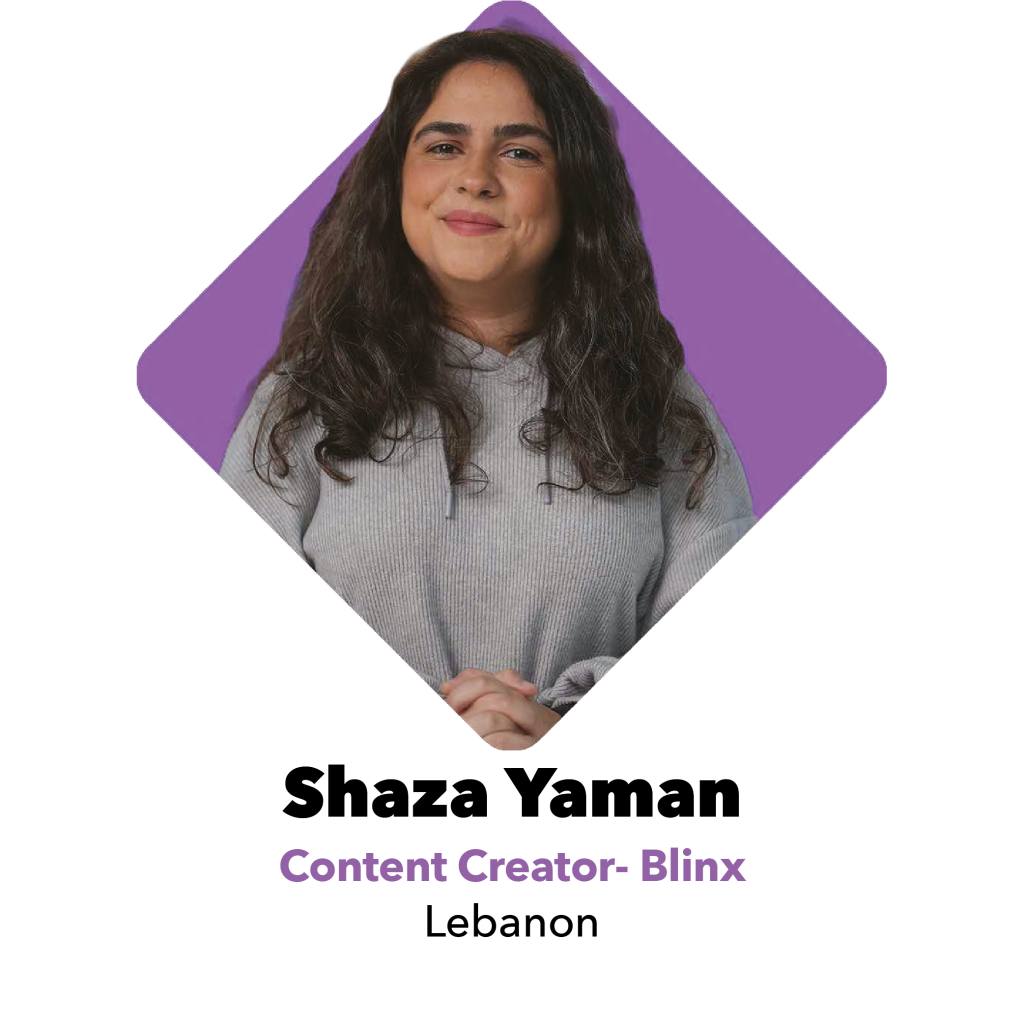
Shaza Al Yaman is a politician’s worst nightmare.
She began her journey as a musician, casually posting cover songs on Instagram, until Lebanon’s political and economic collapse between 2019 and 2022 turned her life upside down.
Forced to leave the country, she found a new stage at Blinx in Dubai one of the region’s leading digital media platforms where she transformed her trauma into satire. Armed with a sharp tongue and an even sharper sense of humor, she began creating viral videos that called out politicians, dissected their failures, and served the truth with a healthy dose of sarcasm.
Audiences describe her videos as hilarious and eye-opening. Politicians? Let’s just say… their reviews haven’t been quite as glowing.
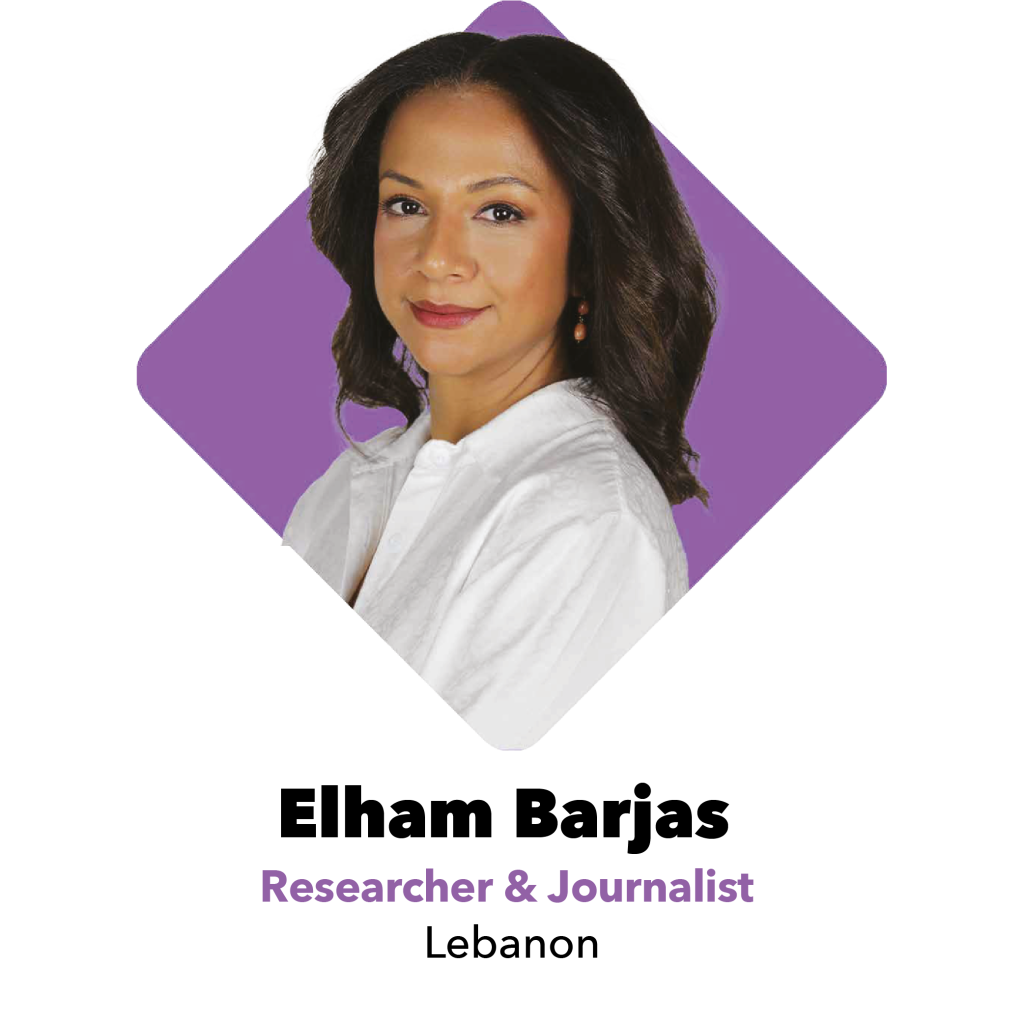
A social feminist activist with a master’s degree in public law. She has seven years of experience as a journalist, focusing on judicial systems, human rights, and feminist movements. As a researcher, she examines institutional rights violations and the impact of technology and artificial intelligence on human rights.
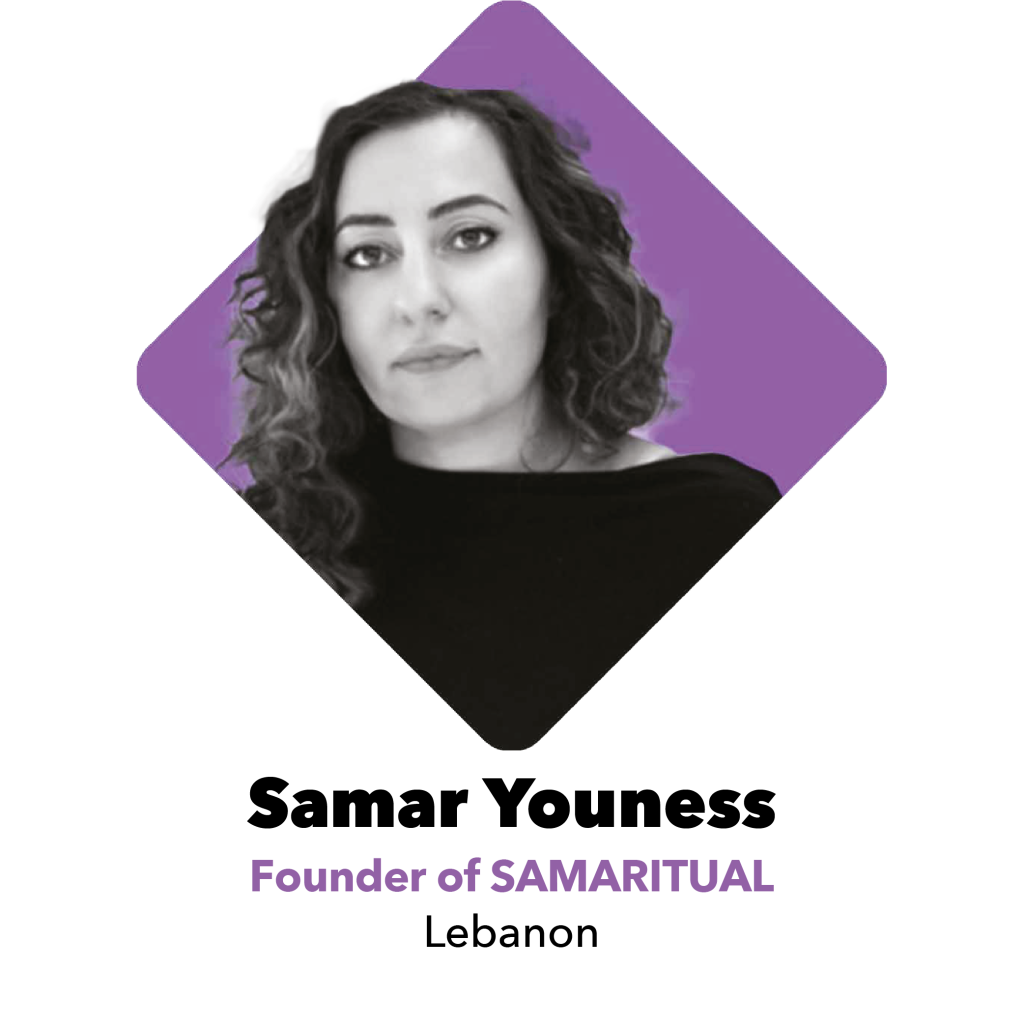
Samar is a quantum cultural architect developing transcultural intelligence frameworks through her practice SAMARITUAL. Working at the intersection of cultural memory and computational systems, she treats artificial intelligence as concentrated cultural memory rather than extraction technology. Her Quantum Craft methodology trains multiple intelligence systems – artisanal, ancestral, ecological, and artificial – as collaborative resistance practice. Based between the Global South and North, Samar’s work excavates hidden cultural algorithms while nurturing hybrid futures that refuse binary thinking. Her practice spans strategic cultural interventions, speculative artifacts, and educational laboratories that hack reality’s operating system.
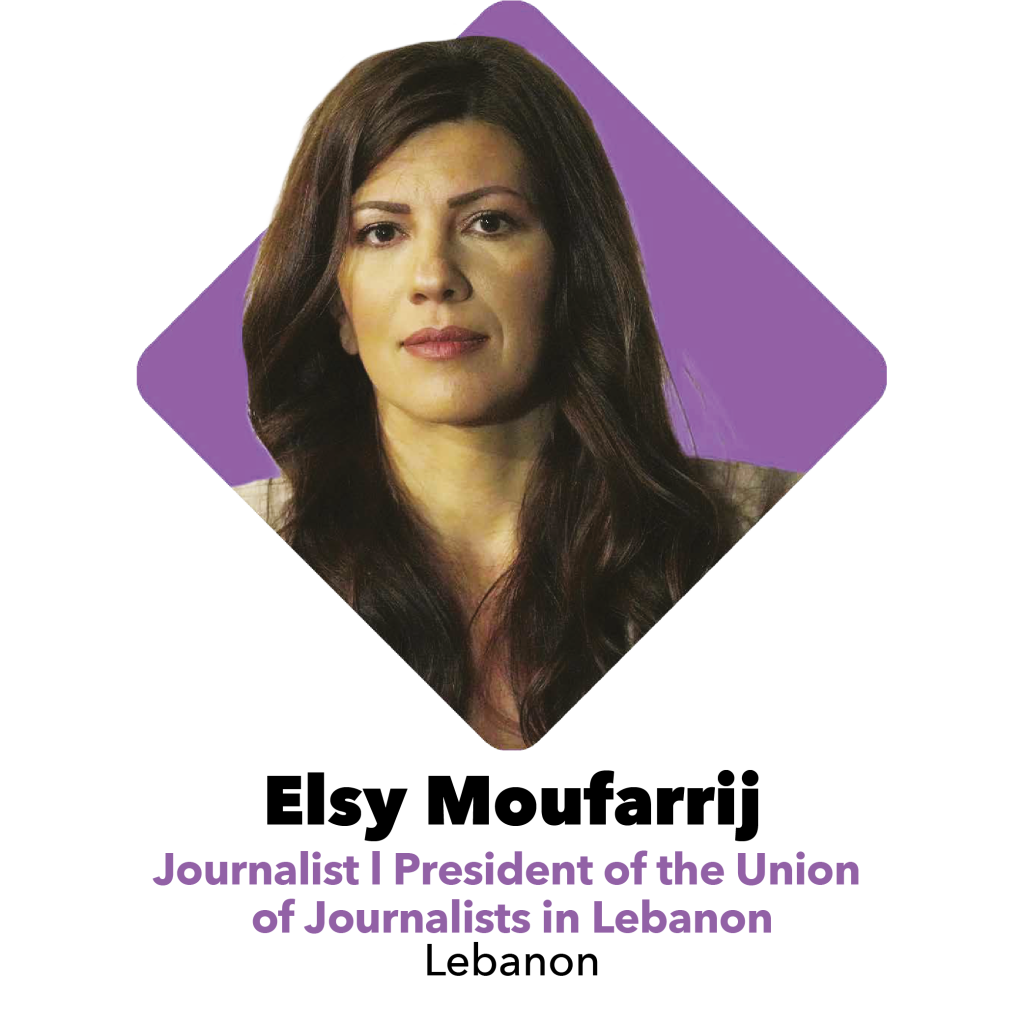
Senior journalist with over 18 years of experience in journalism, media production, and advocacy. She specializes in human rights reporting, investigative journalism, and debate training. Throughout her career, Elsy has produced and coordinated impactful television programs, including live debates and public affairs shows, and has trained hundreds of young people in public speaking and media literacy.
As the elected Coordinator of the Alternative Press Syndicate (now the Union of Journalists in Lebanon), she has led successful national campaigns to defend journalists’ rights, advance media reform, and promote press freedom. Elsy holds a Master’s degree in Political Science and Journalism.
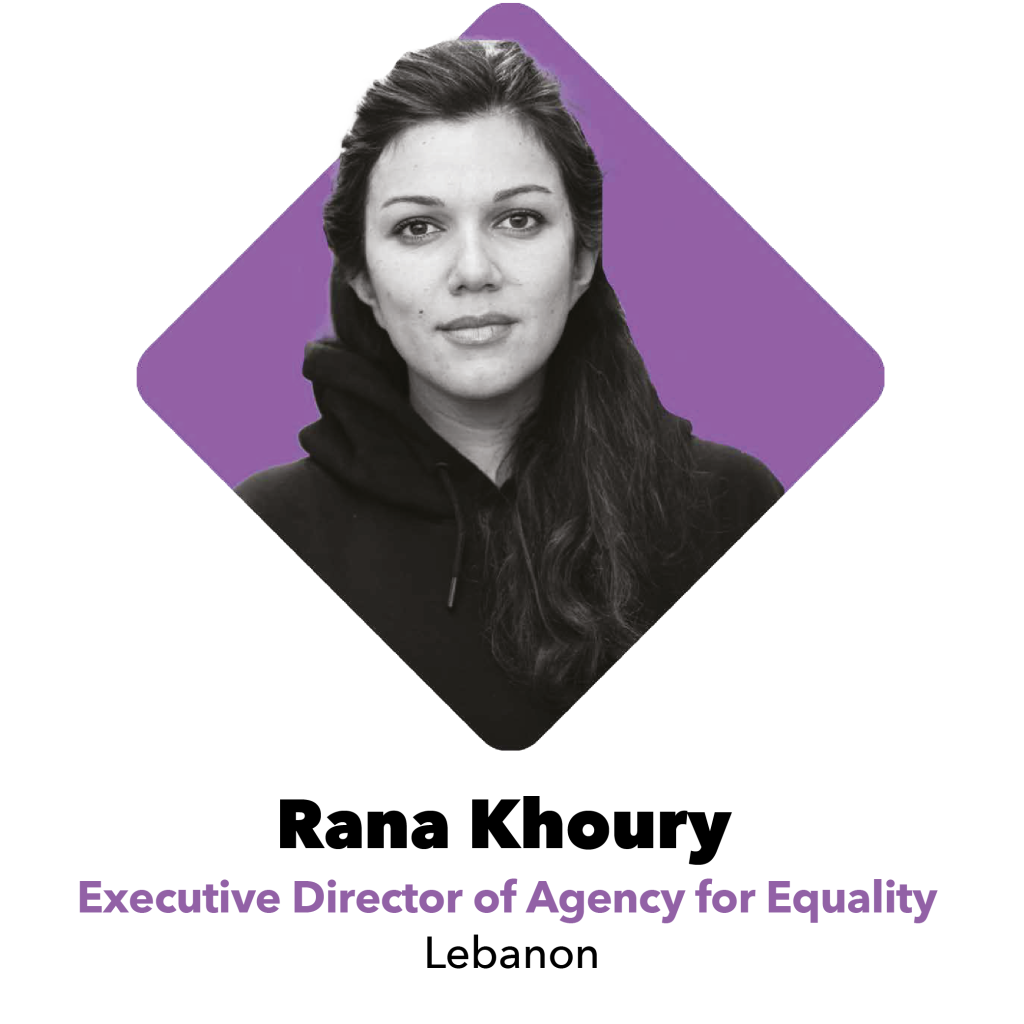
Rana Khoury, Director of Agency for Equality and Executive Creative Director, is one of the leading creative forces behind the Arab region’s most impactful gender equality campaigns. Agency for Equality is a media and marketing non-profit organization that supports independent media in building sustainable revenues through marketing services.
Rana’s work has earned international awards, including 30 Cannes Lions alongside awards from D&AD, EPICA, EFFIES, CAPLES, LYNX, and more. She has also served on local, regional, and international juries. In recent years, she has dedicated her career to campaigns designed to deliver real change on the ground. Many of these have achieved significant impact on communities in Lebanon and across the region, contributing to change at institutional levels.
She has also shared her expertise through teaching a Creative Writing for Media and Communication course at the American University of Beirut.
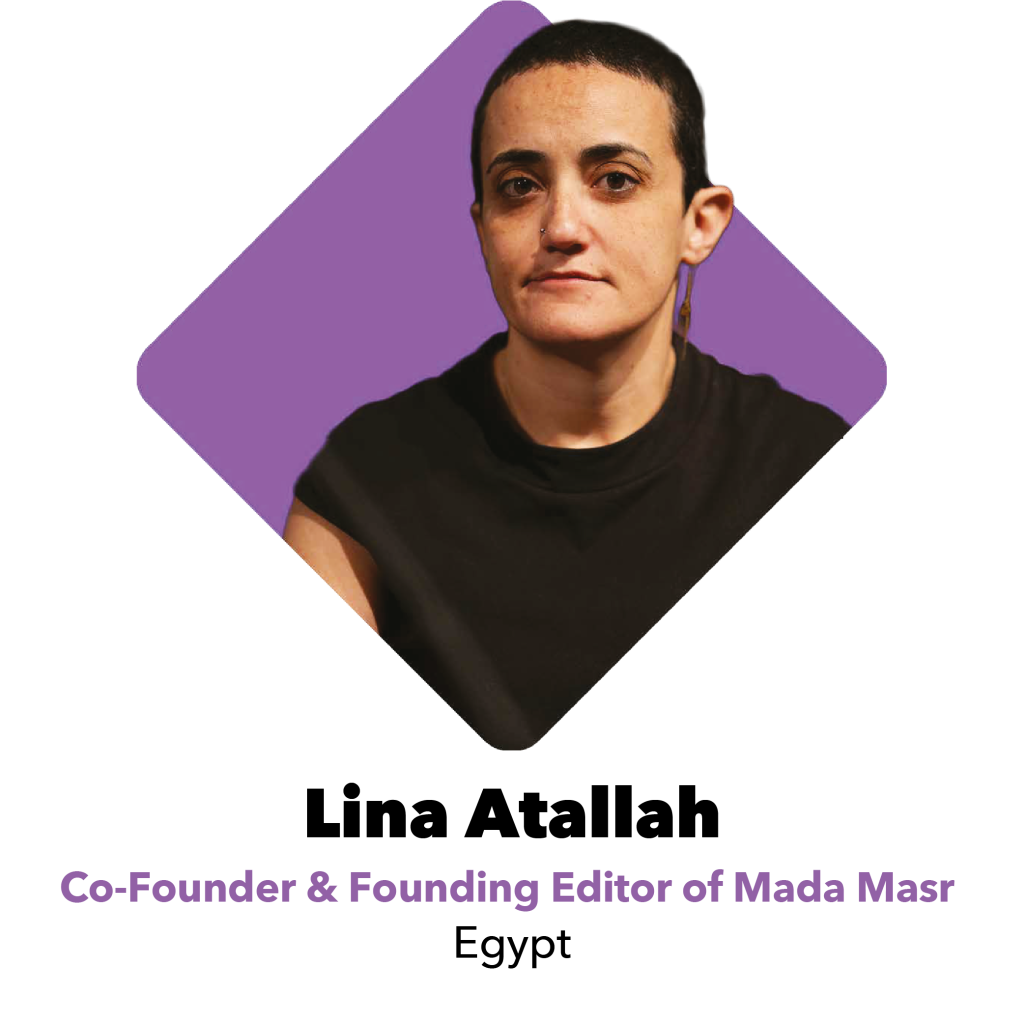
Co-founder and founding editor of Mada Masr, an independent Cairo-based news platform. With nearly two decades of experience in journalism across the region, she is widely recognized for her courageous and impactful reporting on political and social issues in Egypt and beyond.
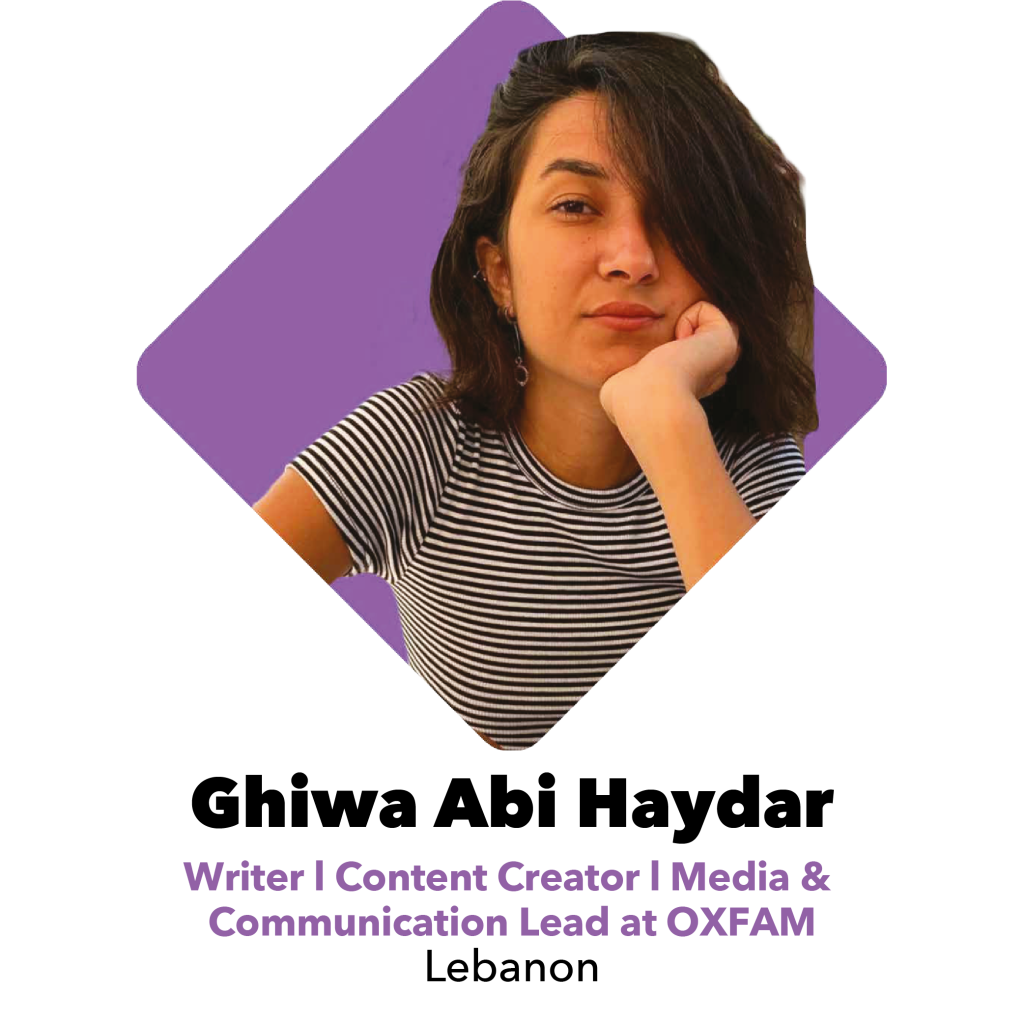
Writer, content creator, and feminist activist currently leading media and communications at Oxfam in Lebanon. She brings over eight years of experience in digital media, content creation, and campaign management, with a focus on social and feminist issues.
Previously, she served as Head of Social Media at Daraj, where she developed digital strategies and collaborated with editorial and creative teams to produce engaging and impactful content. Since 2023, she has been working as a freelance content creator with NO2TA – The Feminist Lab, where she has developed intersectional feminist content, including articles, video series, and scripts aimed at a diverse and youthful audience. She also wrote and hosted the show Tal‘a Nazleh. Her writings have appeared on several Arabic platforms, including Vice Arabia, Daraj, Raseef22, and Nuqtah, covering topics ranging from women’s and youth issues to queer communities and personal experiences.
Ghiwa believes in the power of storytelling and sees content not just as a tool for communication, but as a form of resistance and a catalyst for change.
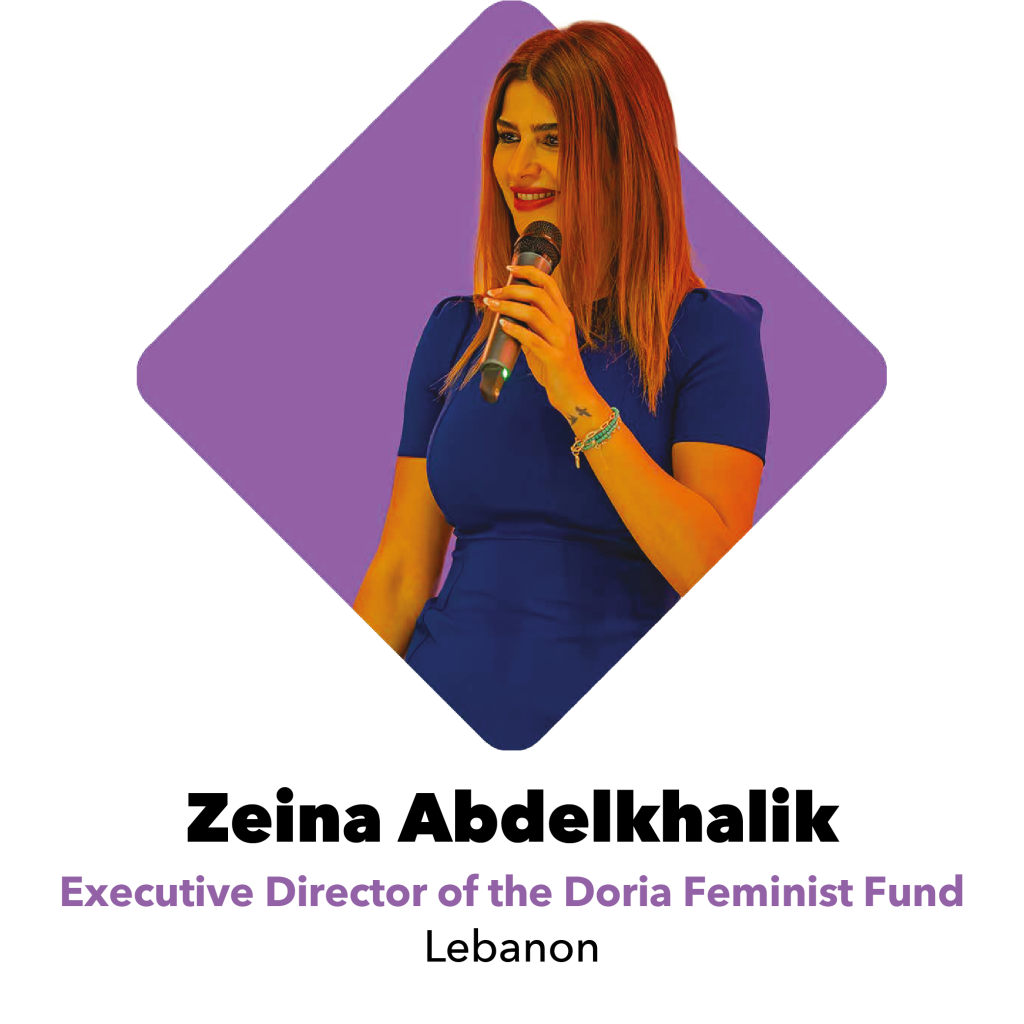
A feminist and human rights advocate, she holds a BSc in Biology and a Master’s in Public Health from the American University of Beirut. She is also a certified gender trainer from KIT Royal Tropical Institute in Amsterdam.
With over 15 years of experience in the field of women’s rights and gender equality, she is a seasoned development and gender expert with extensive work in programming, policy development, research, and organizational strengthening. Her expertise spans critical areas such as gender mainstreaming, gender-based violence (GBV), women’s participation in decision-making, and the empowerment of feminist movements. She currently serves as the Executive Director of the Doria Feminist Fund, the first feminist fund based in the MENA region and is the Co-Chair of the NGO CSW Arab States Caucus.
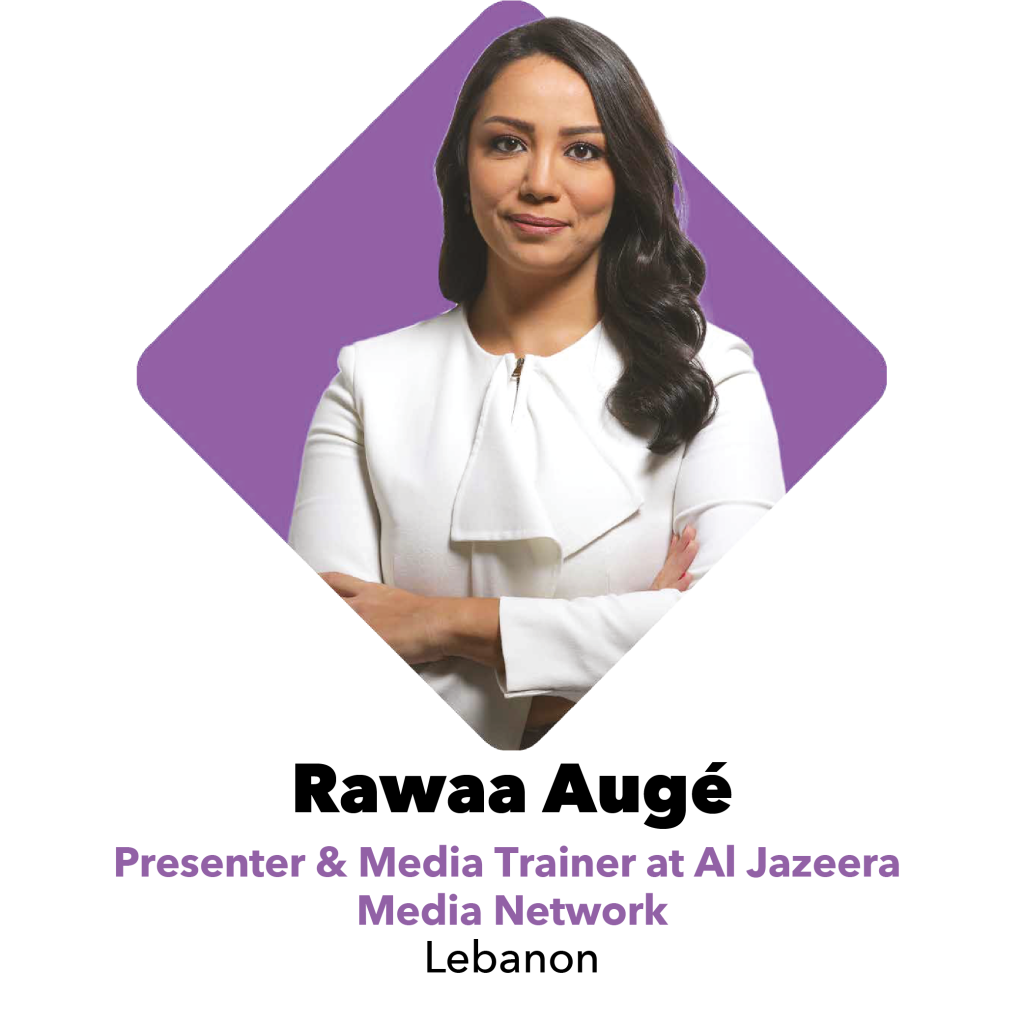
A presenter and media trainer at Al Jazeera Media Network. She is the host and executive producer of the daily news podcast Baad Ams, as well as a documentary series about children in warzones titled Dahaya wa Abtal. Rawaa also hosts Center Stage. Previously, she presented and produced Bikasretta, a platform dedicated to women on Al Jazeera Arabic, and has worked as a news anchor for both Al Jazeera and France 24. In her personal time, Rawaa shares a mini vlog called Oudet Rawaa.
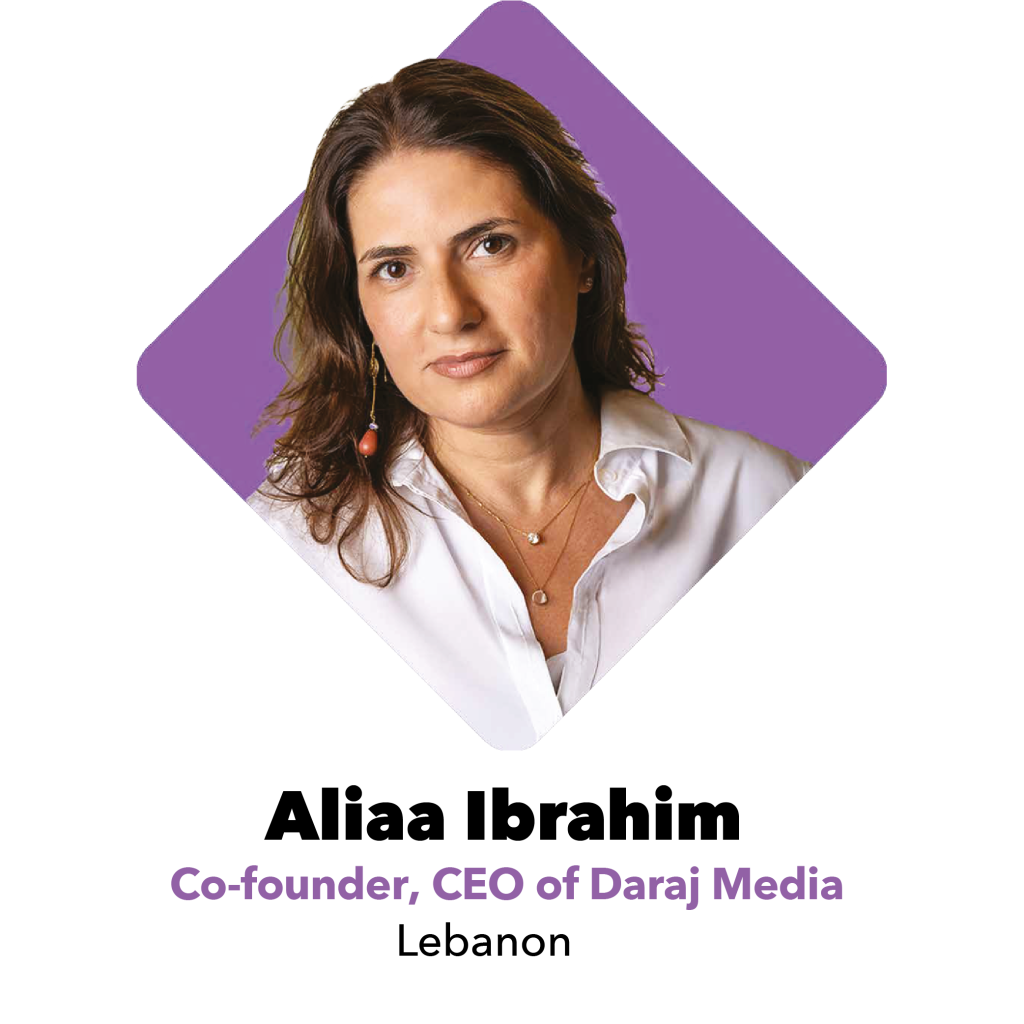
Investigative journalist, writer, producer and director with more than 25 years of experience. After graduation from the American University of Beirut, she started her career at The Daily Star newspaper where she worked for almost a decade, first as a reporter and eventually as a Managing Editor. After a fellowship in the DC headquarters in 2002, Ibrahim joined the Washington Post Beirut Bureau as a Special Correspondent. During this tenure, she also joined Al- Arabiya channel as a Senior Correspondent.
In addition to news coverage from across the region, including that of the Arab Spring, Ibrahim produced and directed episodes for Special Mission, Al-Arabiya’s highest ranking investigative reportage show. She also co-directed The Fifth Generation, an interactive documentary about the demise of ISIS and the birth of a new wave of fundamentalists and was the Executive Producer and writer of a Decade of Spring, a five parts documentary commissioned by Vice News. Ibrahim was a teacher of Journalism and Investigative Journalism at the Lebanese American University and recently joined the Forecast mentorship program in Berlin where she experimented with creative storytelling for documentaries.
She is a mother of two daughters, Yasma 19 and Mia 17.
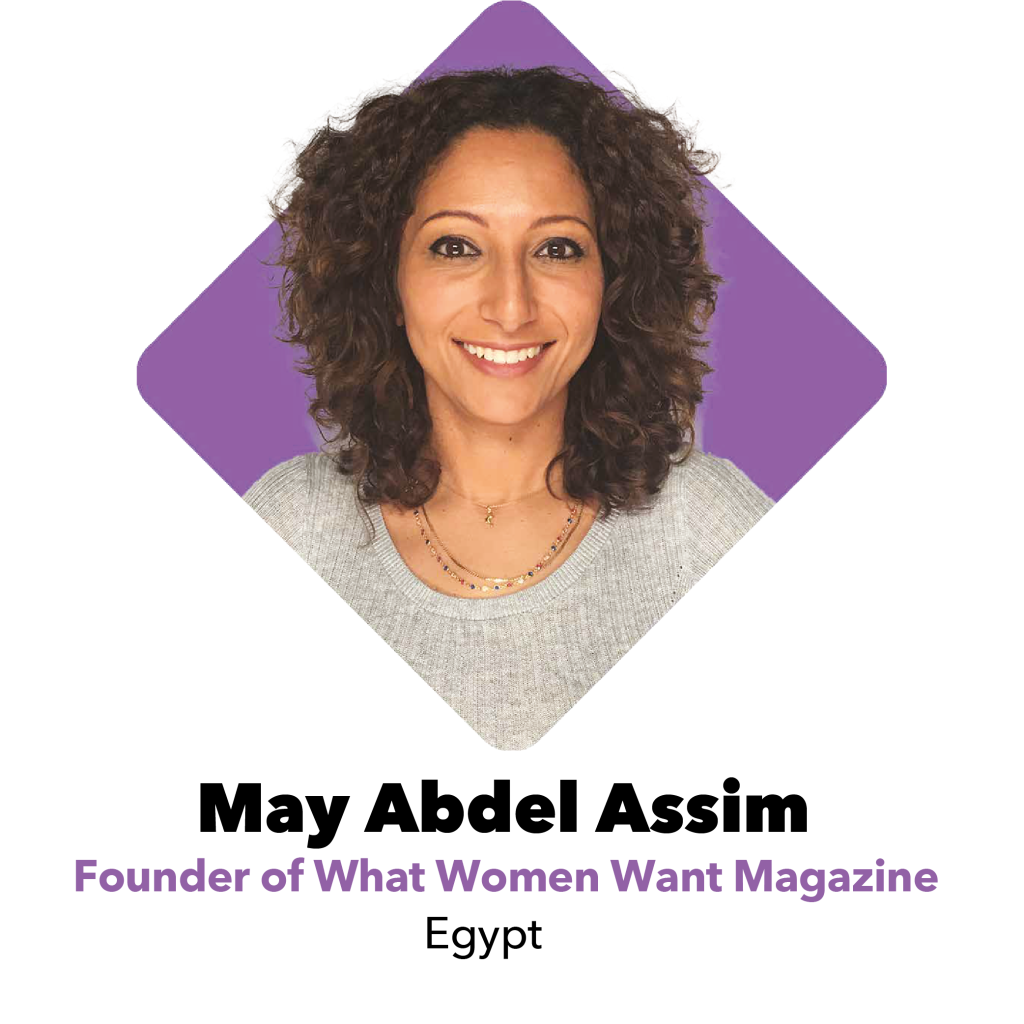
She brings 24 years of professional experience, including 19 years as an entrepreneur. She is the founder and managing director of Media & More, a boutique creative and digital media agency, and the founder of What Women Want… Magazine, one of Egypt’s leading women’s publications, launched in 2006 and now celebrating 19 years of milestones and success stories.
In 2020, she launched Mindfood Publications, the first publishing house in Egypt dedicated exclusively to female authors, with several bestselling titles. In 2023, she founded HerStory Films, the first homegrown production company supporting female filmmakers. Through Media & More, May has led digital and creative services for over 17 years, delivering social media, online marketing, design, content creation, and viral video production to a wide range of clients across industries.
May holds a degree in Mass Communications with a specialization in Integrated Marketing Communications. She began her career in marketing research and held several positions across telecom and FMCG sectors before launching her own business in 2006.
Outside of work, she is actively involved in community initiatives and social projects. A mother of two girls, she was a TEDxCairoWomen 2016 speaker, and WED Egypt Ambassador (2016–2018), where she helped build a network of female entrepreneurs. She is also the founder of Hanefra7 Biki Emta, a movement promoting women’s empowerment through What Women Want…Magazine, and Mish Asthma, an initiative supporting underprivileged children with asthma in Egypt.
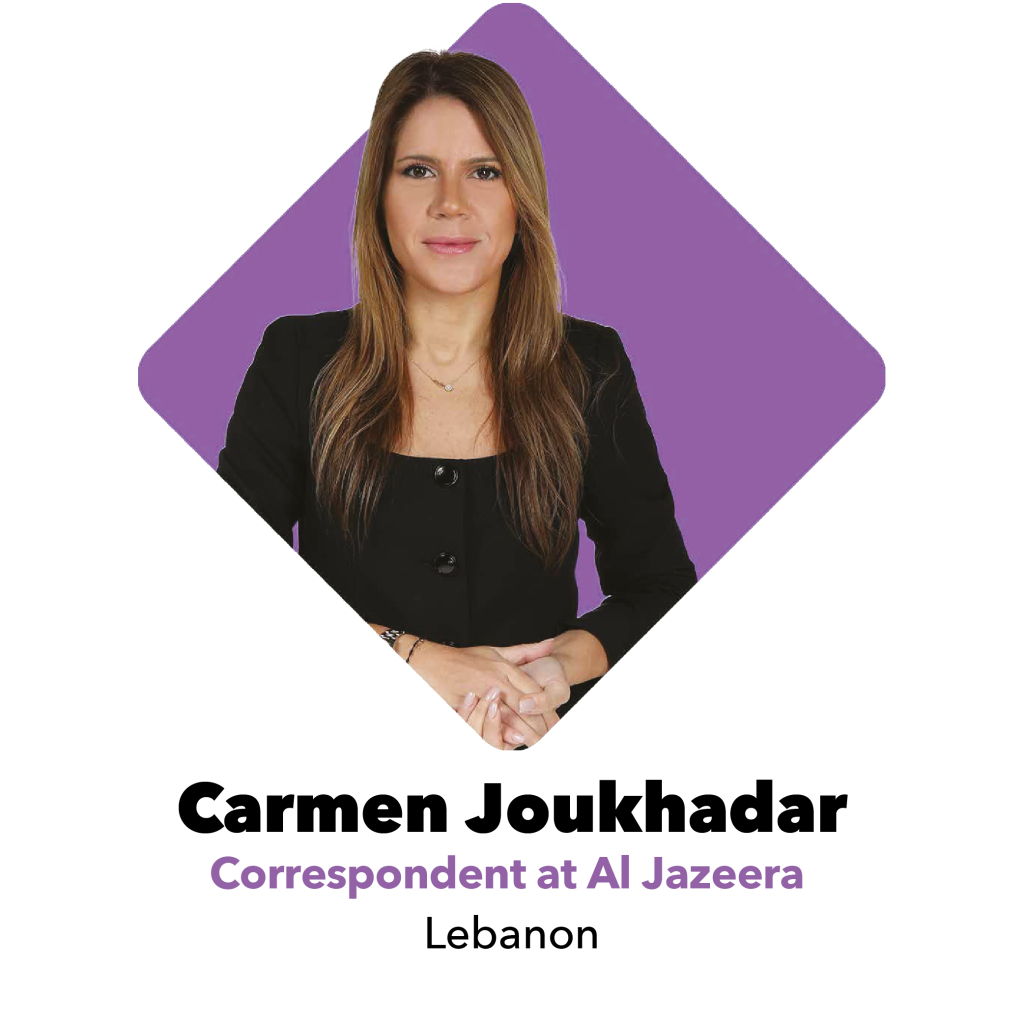
Carmen Joukhadar did not hesitate to report the daily realities of war, even after being injured. She insists that she is neither a survivor nor a victim. She was targeted because she is a journalist—and for that very reason, she returned to the field. She came back to reporting with an even stronger commitment to professional ethics and journalistic principles.
From ground zero at Lebanon’s southern border, she worked to convey the truth, despite attempts to obscure reality and reshape the narrative. She shares details of coverage that bear the weight of documenting historical events in the Arab region and exposing crimes against tens of thousands of civilians. At the border, Carmen stood with courage and professionalism, reporting through sound and image on events the region had not witnessed in decades.
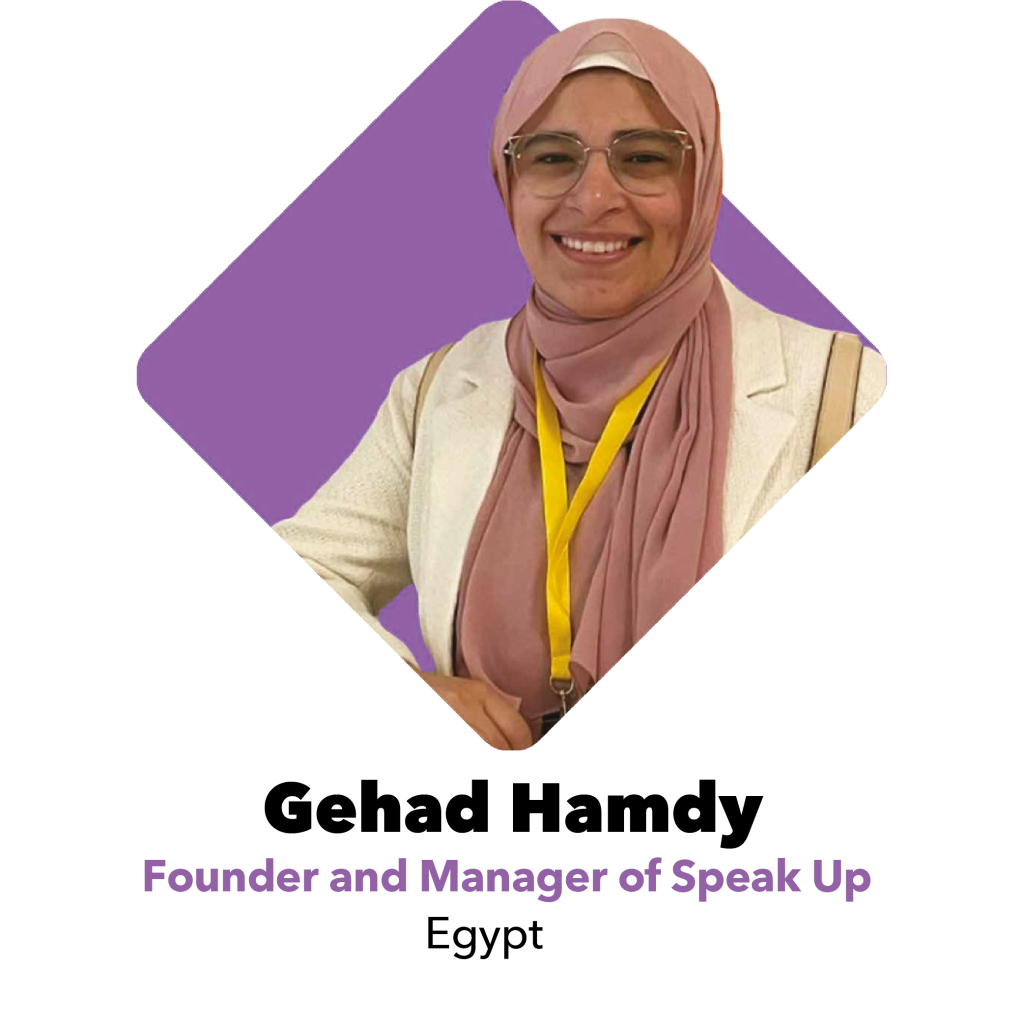
Founder and manager of Speak Up, a leading Egyptian feminist initiative against sexual harassment and gender-based violence. She holds a Bachelor of Dental Surgery.
Gehad’s work focuses on breaking the cycle of violence against women in Egypt. She was named one of BBC 100’s most influential women in the world in 2022, and is the winner of the 2022 Social Change Maker of the Year in Gender Gold Award by The Stevie Awards, The Changemaker and The Humanitarian awards by Women SME Leaders Awards by Entrepreneur Middle East, the winner of the International Humanitarian award at Women4Africa, was a finalist for the Women Empowerment Award by Africa Women Innovation & Entrepreneurship Forum (AWIEF), and a finalist for the Equal Rights and Non-Discrimination award at the World Justice Forum 2022.”
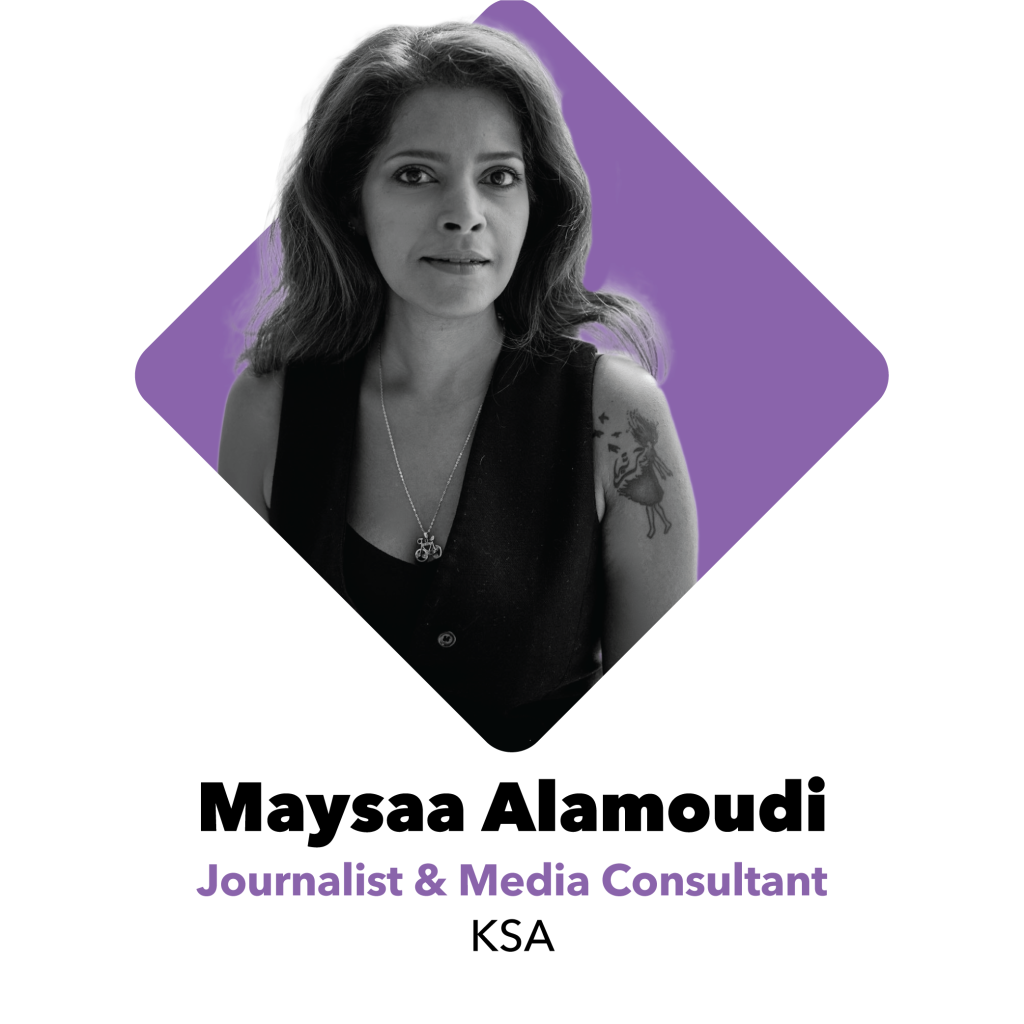
A journalist, feminist thinker, media consultant, and
multimedia storyteller based in New York. With nearly two decades of
experience in Arab media, she has worked as a TV anchor and presenter for
major satellite networks including MBC, Alhurra TV, Al Aan TV, and
Rotana—where she was the leading face of the relaunched Sayidaty, one of the
region’s most prominent women-focused programs. During the Arab Spring, she
hosted Musaawa (Equality), a groundbreaking show highlighting women’s and
minority rights.
Her work bridges journalism, advocacy, and digital storytelling, with a strong
focus on women’s empowerment, freedom of expression, and emotional
healing. On social media, Maysaa creates engaging video content around gender
awareness, emotional resilience, and societal taboos. She also writes opinion
pieces for Daraj and leads private women’s healing circles rooted in alternative
therapeutic practices. Her Arabic podcast العقل عين | Mind’s Eye offers reflective
audio experiences centered on self-inquiry, energetic balance, and inner growth
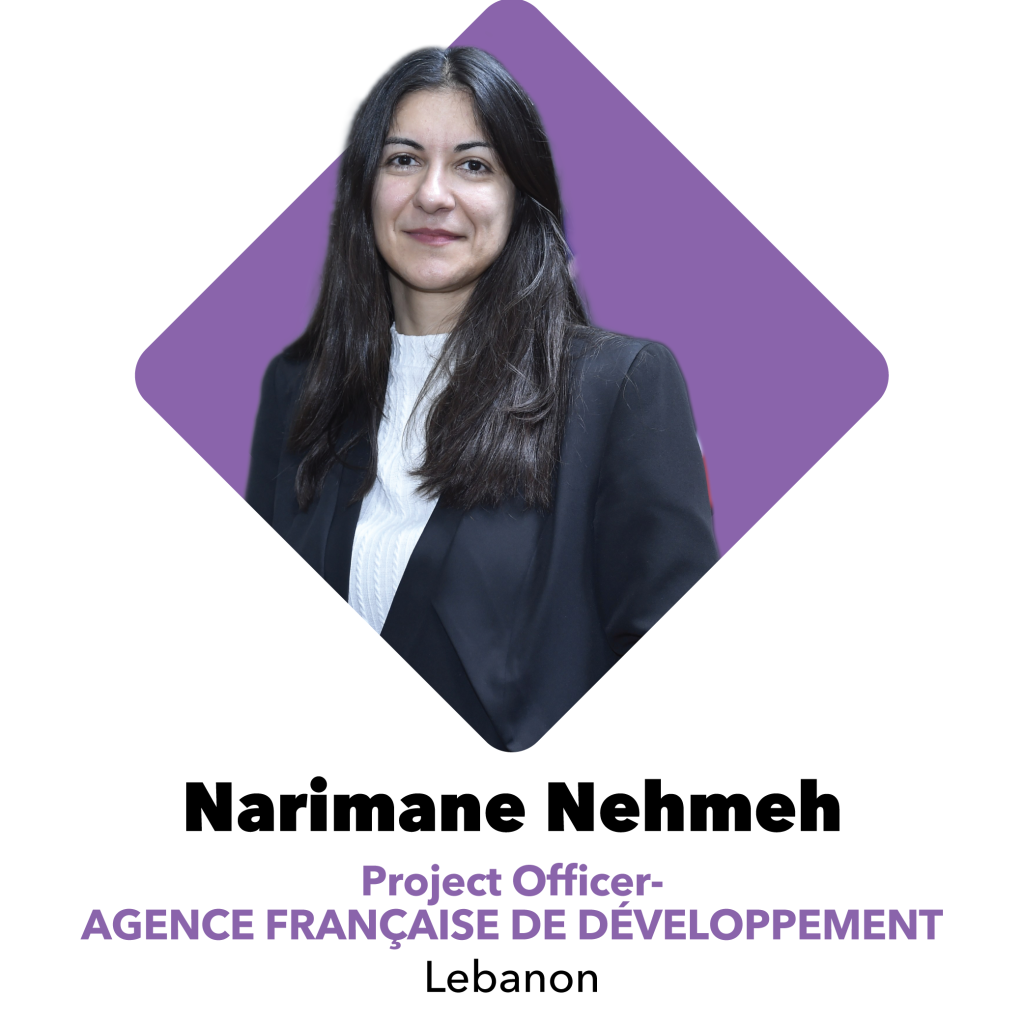
With a background in finance, Narimane works as a Project Officer at the Agence Française de Développement’s Regional office in Beirut, coordinating development projects in various sectors including civil society and media support, water, agriculture.
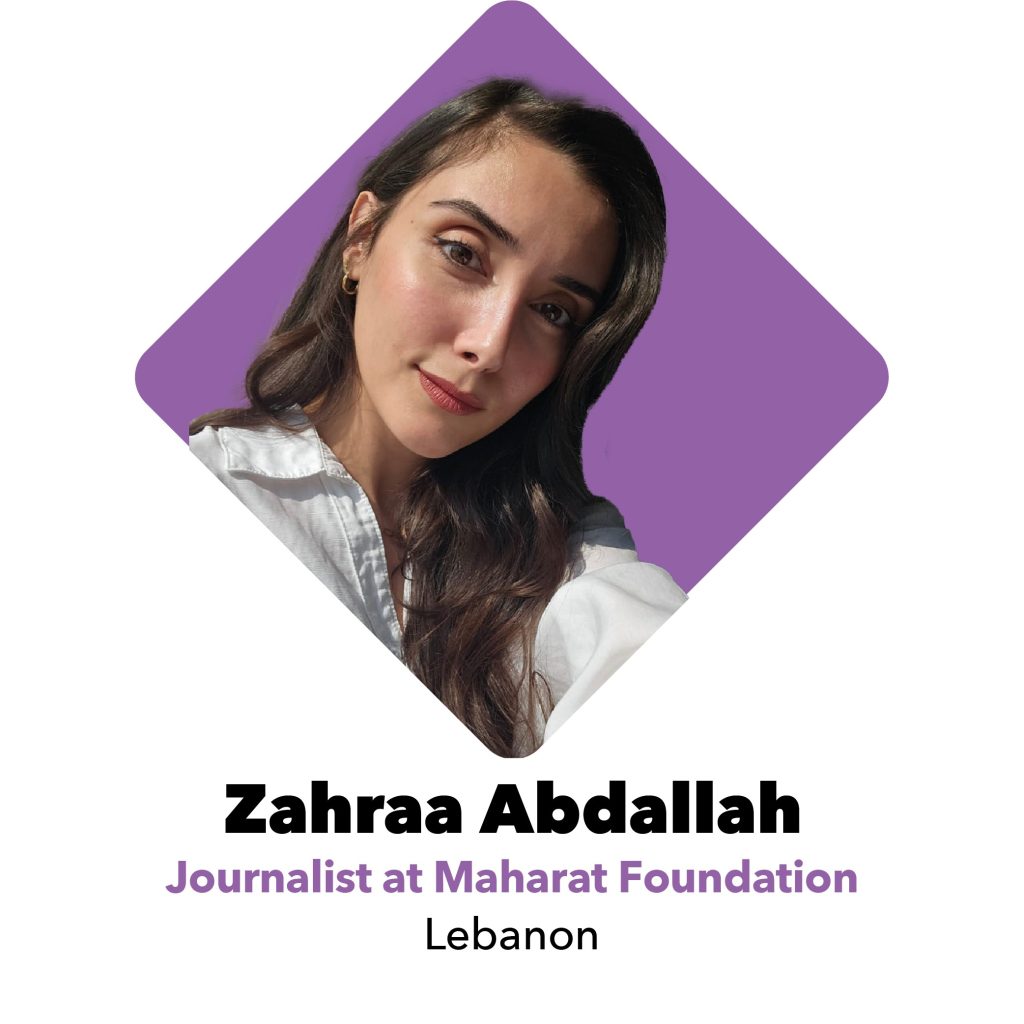
Zahraa Abdullah is a journalist at Maharat Foundation, a researcher in the field of defending freedoms, a fact-checker, and a specialist in investigative journalism. She has contributed to the preparation of studies and research papers on information integrity, the impact of conflicts on media and journalism in the Middle East and North Africa, and the promotion of media freedom in Lebanon. She has also participated in supervising several journalism fellowships focused on gender-sensitive reporting, sexual and reproductive rights, media freedoms, and religious diversity.

